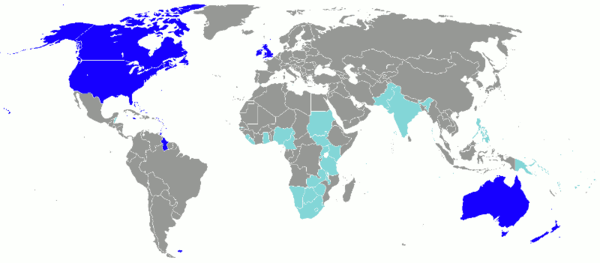Nigeria
Coordinates: 8°N 10°E / 8°N 10°E
Federal Republic of Nigeria
| |
|---|---|
 Flag
| |
Motto: "Unity and Faith, Peace and Progress" | |
Anthem: "Arise, O Compatriots" | |
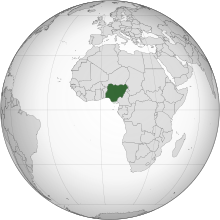 | |
| Capital | Abuja 9°4′N 7°29′E / 9.067°N 7.483°E |
| Largest city | Lagos |
| Official languages | English |
| National languages |
|
| Other languages[1] | show
List |
| Ethnic groups (2018)[2] |
|
| Demonym(s) | Nigerian |
| Government | Federal presidential constitutional republic |
| Muhammadu Buhari | |
| Yemi Osinbajo | |
• Senate President | Ahmed Lawan |
| Femi Gbajabiamila | |
| Tanko Muhammad | |
| Legislature | National Assembly |
• Upper house | Senate |
• Lower house | House of Representatives |
| Independence from United Kingdom | |
• Declaration | 1 October 1960 |
| 1 October 1963 | |
• Current constitution | 29 May 1999 |
| Area | |
• Total | 923,769 km2 (356,669 sq mi) (32nd) |
• Water (%) | 1.4 |
| Population | |
• 2021 estimate | 211,400,708[3] (7th) |
• 2006 census | 140,431,691 |
• Density | 218/km2 (564.6/sq mi) (42nd) |
| GDP (PPP) | 2021 estimate |
• Total | $1.116 trillion[4] (25th) |
• Per capita | $5,280 (129th) |
| GDP (nominal) | 2021 estimate |
• Total | $514.049 billion[4] (27th) |
• Per capita | $2,432 (137th) |
| Gini (2020) | medium |
| HDI (2019) | low · 161st |
| Currency | Naira (₦) (NGN) |
| Time zone | UTC+01:00 (WAT) |
| Driving side | right side of road[7] |
| Calling code | +234 |
| ISO 3166 code | NG |
| Internet TLD | .ng |
Nigeria (/naɪˈdʒɪəriə/ (![]() listen)), officially the Federal Republic of Nigeria, is a country in West Africa. It is the most populous country in Africa; geographically situated between the Sahel to the north, and the Gulf of Guinea to the south in the Atlantic Ocean; covering an area of 923,769 square kilometers, with a population of over 211 million. It borders Niger in the north, Chad in the northeast, Cameroon in the east, and Benin in the west. Nigeria is a federal republic comprising 36 states and the Federal Capital Territory, where the capital, Abuja, is located. The largest city in Nigeria is Lagos, one of the largest metropolitan areas in the world and second largest in Africa.
listen)), officially the Federal Republic of Nigeria, is a country in West Africa. It is the most populous country in Africa; geographically situated between the Sahel to the north, and the Gulf of Guinea to the south in the Atlantic Ocean; covering an area of 923,769 square kilometers, with a population of over 211 million. It borders Niger in the north, Chad in the northeast, Cameroon in the east, and Benin in the west. Nigeria is a federal republic comprising 36 states and the Federal Capital Territory, where the capital, Abuja, is located. The largest city in Nigeria is Lagos, one of the largest metropolitan areas in the world and second largest in Africa.
Nigeria has been home to several indigenous pre-colonial states and kingdoms since the second millennium BC, with the Nok civilization in the 15th century BC marking the first internal unification in the country. The modern state originated with British colonialization in the 19th century, taking its present territorial shape with the merging of the Southern Nigeria Protectorate and Northern Nigeria Protectorate in 1914 by Lord Lugard. The British set up administrative and legal structures while practising indirect rule through traditional chiefdoms.[8] Nigeria became a formally independent federation on October 1, 1960. It experienced a civil war from 1967 to 1970, followed by a succession of democratically-elected civilian governments and military dictatorships, until achieving a stable democracy in the 1999 presidential election; the 2015 election was the first time an incumbent president had lost re-election.[9]
Nigeria is a multinational state inhabited by more than 250 ethnic groups speaking 500 distinct languages, all identifying with a wide variety of cultures.[10][11][12] The three largest ethnic groups are the Hausa–Fulani in the north, Yoruba in the west, and Igbo in the east, together comprising over 60% of the total population.[13] The official language is English, chosen to facilitate linguistic unity at the national level.[14] Nigeria's constitution ensures freedom of religion[15] and is home to some of the world's largest Muslim and Christian populations, simultaneously.[16] Nigeria is divided roughly in half between Muslims, who live mostly in the north, and Christians, who live mostly in the south; indigenous religions, such as those native to the Igbo and Yoruba ethnicities, are in the minority.[17]
Nigeria's economy is the largest in Africa, the 27th-largest in the world by nominal GDP, and 25th-largest by PPP. Nigeria is often referred to as the Giant of Africa owing to its large population and economy[18] and is considered to be an emerging market by the World Bank. It is a regional power in Africa, a middle power in international affairs, and is an emerging global power. However, the country ranks very low in the Human Development Index and remains one of the most corrupt nations in the world.[19][20] Nigeria is a founding member of the African Union and a member of many international organizations, including the United Nations, the Commonwealth of Nations, the Economic Community of West African States, and OPEC. It is also a member of the informal MINT group of countries, and is one of the Next Eleven economies.
Etymology
The name Nigeria was taken from the Niger River running through the country. This name was coined on January 8, 1897, by British journalist Flora Shaw, who later married Lord Lugard, a British colonial administrator. The neighbouring Niger takes its name from the same river. The origin of the name Niger, which originally applied to only the middle reaches of the Niger River, is uncertain. The word is likely an alteration of the Tuareg name egerew n-igerewen used by inhabitants along the middle reaches of the river around Timbuktu prior to 19th-century European colonialism.[21][22]
History
Prehistory

Kainji Dam excavations revealed ironworking by the 2nd century BC. The transition from Neolithic times to the Iron Age apparently was achieved without intermediate bronze production. Others suggest the technology moved west from the Nile Valley, although the Iron Age in the Niger Rivervalley and the forest region appears to predate the introduction of metallurgy in the upper savanna by more than 800 years.
The Nok civilization of Nigeria flourished between 1,500 BC and AD 200. It produced life-sized terracotta figures that are some of the earliest known sculptures in Sub-Saharan Africa[23][24][25][26][27] and smelted iron by about 550 BC and possibly a few centuries earlier.[28][29][30] Evidence of iron smelting has also been excavated at sites in the Nsukka region of southeast Nigeria: dating to 2000 BC at the site of Lejja[31] and to 750 BC and at the site of Opi.
Early history

The Kano Chronicle highlights an ancient history dating to around 999 AD of the Hausa Sahelian city-state of Kano, with other major Hausa cities (or Hausa Bakwai) of: Daura, Hadeija, Kano, Katsina, Zazzau, Rano, and Gobir all having recorded histories dating back to the 10th century. With the spread of Islam from the 7th century AD, the area became known as Sudan or as Bilad Al Sudan (English: Land of the Blacks; Arabic: بلاد السودان). Since the populations were partially affiliated with the Arab Muslim culture of North Africa, they began Trans-Saharan trade and were referred to by the Arabic speakers as Al-Sudan (meaning "The Blacks") as they were considered an extended part of the Muslim world. There are early historical references by medieval Arab and Muslim historians and geographers which refer to the Kanem-Bornu Empire as the region's major centre for Islamic civilization.
The Kingdom of Nri of the Igbo people consolidated in the 10th century and continued until it lost its sovereignty to the British in 1911.[32][33] Nri was ruled by the Eze Nri, and the city of Nri is considered to be the foundation of Igbo culture. Nri and Aguleri, where the Igbo creation myth originates, are in the territory of the Umeuri clan. Members of the clan trace their lineages back to the patriarchal king-figure Eri.[34] In West Africa, the oldest bronzes made using the lost-wax process were from Igbo-Ukwu, a city under Nri influence.[32] The Yoruba kingdoms of Ife and Oyo in southwestern Nigeria became prominent in the 12th[35][36] and 14th[37] centuries, respectively. The oldest signs of human settlement at Ife's current site date back to the 9th century,[35] and its material culture includes terracotta and bronze figures.
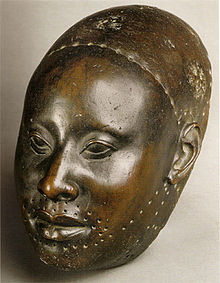
Pre-colonial era
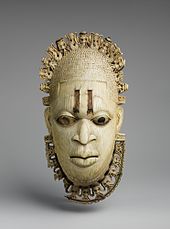
In the 16th century, Portuguese explorers were the first Europeans to begin significant, direct trade with peoples of southern Nigeria, at the port they named Lagos (formerly Eko) and in Calabar along the region Slave Coast. Europeans traded goods with peoples at the coast; coastal trade with Europeans also marked the beginnings of the Atlantic slave trade.[38] The port of Calabar on the historical Bight of Biafra (now commonly referred to as the Bight of Bonny) became one of the largest slave trading posts in West Africa in the era of the transatlantic slave trade. Other major slaving ports in Nigeria were located in Badagry, Lagos on the Bight of Benin and on Bonny Island on the Bight of Biafra.[38][39] The majority of those enslaved and taken to these ports were captured in raids and wars.[40] Usually the captives were taken back to the conquerors' territory as forced labour; after time, they were sometimes acculturated and absorbed into the conquerors' society. Slave routes were established throughout Nigeria linking the hinterland areas with the major coastal ports. Some of the more prolific slave trading kingdoms who participated in the transatlantic slave trade were linked with the Edo's Benin Empire in the south, Oyo Empire in the southwest, and the Aro Confederacy in the southeast.[38][39] Benin's power lasted between the 15th and 19th centuries.[41] Oyo, at its territorial zenith in the late 17th to early 18th centuries, extended its influence from western Nigeria to modern-day Togo.
In the north, the incessant fighting amongst the Hausa city-states and the decline of the Bornu Empire gave rise to the Fulani people gaining headway into the region. Until this point, the Fulani a nomadic ethnic group primarily traversed the semi-desert Sahelian region, north of the Sudan, with cattle and avoided trade and intermingling with the Sudanic peoples. At the beginning of the 19th century, Usman dan Fodio led a successful jihad against the Hausa Kingdoms founding the centralised Sokoto Caliphate. The empire with Arabic as its official language grew rapidly under his rule and that of his descendants, who sent out invading armies in every direction. The vast landlocked empire connected the east with the west Sudan region and made inroads down south conquering parts of the Oyo Empire (modern-day Kwara), and advanced towards the Yoruba heartland of Ibadan, with the goal of reaching the Atlantic Ocean. The territory controlled by the empire included much of modern-day northern and central Nigeria. The sultan sent out emirs to establish a suzerainty over the conquered territories and promote Islamic civilization, the emirs in turn became increasingly rich and powerful through trade and slavery. By the 1890s, the largest slave population in the world, about two million, was concentrated in the territories of the Sokoto Caliphate. The use of slave labor was extensive, especially in agriculture.[42] By the time of its break-up in 1903 into various European colonies, the Sokoto Caliphate was one of the largest pre-colonial African states.[43]
British colonization

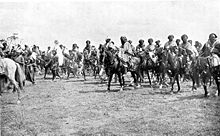


A changing legal imperative (the transatlantic slave trade was outlawed by Britain in 1807) and economic imperative (a desire for political and social stability) led most European powers to support the widespread cultivation of agricultural products, such as the palm, for use in European industry. The Atlantic slave trade was engaged in by European companies until it was outlawed in 1807. After that illegal smugglers purchased slaves along the coast by native slavers. Britain's West Africa Squadron sought to intercept the smugglers at sea. The rescued slaves were taken to Freetown, a colony in West Africa originally established for the resettlement of freed slaves from Britain.
Britain intervened in the Lagos kingship power struggle by bombarding Lagos in 1851, deposing the slave-trade-friendly Oba Kosoko, helping to install the amenable Oba Akitoye and signing the Treaty between Great Britain and Lagos on 1 January 1852. Britain annexed Lagos as a crown colony in August 1861 with the Lagos Treaty of Cession. British missionaries expanded their operations and traveled further inland. In 1864, Samuel Ajayi Crowther became the first African bishop of the Anglican Church.[44]
In 1885, British claims to a West African sphere of influence received recognition from other European nations at the Berlin Conference. The following year, it chartered the Royal Niger Company under the leadership of Sir George Taubman Goldie. By the late 19th and early 20th centuries, the company had vastly succeeded in subjugating the independent southern kingdoms along the Niger River, the British conquered Benin in 1897, and, in the Anglo-Aro War (1901–1902), defeated other opponents. The defeat of these states opened up the Niger area to British rule. In 1900, the company's territory came under the direct control of the British government and established the Southern Nigeria Protectorate as a British protectorate and part of the British Empire, the foremost world power at the time.
By 1902, the British had begun plans to move north into the Sokoto Caliphate. British General Lord Frederick Lugard was tasked by the Colonial Office to implement the agenda. Lugard used rivalries between many of the emirs in the southern reach of the caliphate and the central Sokoto administration to prevent any defense as he worked towards the capital. As the British approached the city of Sokoto, Sultan Muhammadu Attahiru I organized a quick defense of the city and fought the advancing British-led forces. The British force quickly won, sending Attahiru I and thousands of followers on a Mahdist hijra. In the northeast, the decline of the Bornu Empire gave rise to the British-controlled Borno Emirate which established Abubakar Garbai of Borno as ruler.
In 1903, the British victory in the Battle of Kano gave them a logistical edge in pacifying the heartland of the Sokoto Caliphate and parts of the former Bornu Empire. On March 13, 1903, at the grand market square of Sokoto, the last vizier of the caliphate officially conceded to British rule. The British appointed Muhammadu Attahiru II as the new caliph. Lugard abolished the caliphate but retained the title sultan as a symbolic position in the newly organized Northern Nigeria Protectorate. This remnant became known as "Sokoto Sultanate Council". In June 1903, the British defeated the remaining forces of Attahiru I and killed him; by 1906 resistance to British rule had ended.
On January 1, 1914, the British formally united the Southern Nigeria Protectorate and the Northern Nigeria Protectorate into the Colony and Protectorate of Nigeria. Administratively, Nigeria remained divided into the Northern and Southern Protectorates and Lagos Colony. Inhabitants of the southern region sustained more interaction, economic and cultural, with the British and other Europeans owing to the coastal economy.[45] Following World War II, in response to the growth of Nigerian nationalism and demands for independence, successive constitutions legislated by the British government moved Nigeria toward self-government on a representative and increasingly federal basis. By the middle of the 20th century, a great wave for independence was sweeping across Africa.
Christian missions established Western educational institutions in the protectorates. Under Britain's policy of indirect rule and validation of Islamic tradition, the Crown did not encourage the operation of Christian missions in the northern, Islamic part of the country.[46] Some children of the southern elite went to Great Britain to pursue higher education. By independence in 1960, regional differences in modern educational access were marked. The legacy, though less pronounced, continues to the present day. Imbalances between north and south were expressed in Nigeria's political life as well. For instance, northern Nigeria did not outlaw slavery until 1936 whilst in other parts of Nigeria slavery was abolished soon after colonialism.[47][39]
Nigeria gained independence from the United Kingdom on October 1, 1960, as the Federation of Nigeria with Abubakar Tafawa Balewa as its prime minister, while retaining the British monarch, Elizabeth II, as nominal head of state and Queen of Nigeria. Azikiwe replaced the colonial governor-general in November 1960. At independence, the cultural and political differences were sharp among Nigeria's dominant ethnic groups: the Hausa–Fulani in the north, Igbo in the east and Yoruba in the west.[48]
The founding government was a coalition of conservative parties: the Northern People's Congress led by Sir Ahmadu Bello, a party dominated by Muslim northerners, and the Igbo and Christian-dominated National Council of Nigeria and the Cameroons led by Nnamdi Azikiwe. The opposition comprised the comparatively liberal Action Group, which was largely dominated by the Yoruba and led by Obafemi Awolowo. An imbalance was created in the polity by the result of the 1961 plebiscite. Southern Cameroons opted to join the Republic of Cameroon while Northern Cameroons chose to join Nigeria. The northern part of the country became larger than the southern part.

Republican era
Fall of the First Republic and Civil War
In 1963, the nation established a federal republic, with Azikiwe as its first president. The disequilibrium and perceived corruption of the electoral and political process led to two military coups in 1966. The first coup was in January 1966 and was led mostly by Igbo soldiers under Majors Emmanuel Ifeajuna and Chukwuma Kaduna Nzeogwu. The coup plotters succeeded in assassinating Sir Ahmadu Bello and Abubakar Tafawa Balewa alongside prominent leaders of the Northern Region and also Premier Samuel Akintola of the Western Region, but the coup plotters struggled to form a central government. Senate President Nwafor Orizu handed over government control to the Army, under the command of another Igbo officer, General Johnson Aguiyi-Ironsi. Later, the counter-coup of 1966, supported primarily by northern military officers, facilitated the rise of Yakubu Gowon as military head of state. Tension rose between north and south; Igbos in northern cities suffered persecution and many fled to the Eastern Region.[49]
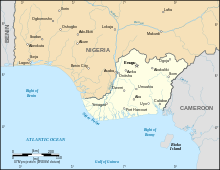
In May 1967, Governor of the Eastern Region Lt. Colonel Emeka Ojukwu declared the region independent from the federation as a state called the Republic of Biafra, under his leadership.[50][51] This declaration precipitated the Nigerian Civil War, which began as the official Nigerian government side attacked Biafra on July 6, 1967, at Garkem. The 30-month war, with a long siege of Biafra and its isolation from trade and supplies, ended in January 1970.[52] Estimates of the number of dead in the former Eastern Region during the 30-month civil war range from one to three million.[53] France, Egypt, the Soviet Union, Britain, Israel, and others were deeply involved in the civil war behind the scenes. Britain and the Soviet Union were the main military backers of the Nigerian government, with Nigeria utilizing air support from Egyptian pilots provided by Gamal Abdel Nasser,[54][55] while France and Israel aided the Biafrans. The Congolese government, under President Joseph-Désiré Mobutu, took an early stand on the Biafran secession, voicing strong support for the Nigerian federal government[56] and deploying thousands of troops to fight against the secessionists.[57][58]
Following the war, Nigeria enjoyed an oil boom in the 1970s, during which the country joined OPEC and received huge oil revenues. Despite these revenues, the military government did little to improve the standard of living of the population, help small and medium businesses, or invest in infrastructure. As oil revenues fueled the rise of federal subsidies to states, the federal government became the centre of political struggle and the threshold of power in the country. As oil production and revenue rose, the Nigerian government became increasingly dependent on oil revenues and international commodity markets for budgetary and economic concerns.[59] The coup in July 1975, led by Generals Shehu Musa Yar'Adua and Joseph Garba, ousted Gowon,[60] who fled to Britain.[61] The coup plotters wanted to replace Gowon's autocratic rule with a triumvirate of three brigadier generals whose decisions could be vetoed by a Supreme Military Council. For this triumvirate, they convinced General Murtala Muhammed to become military head of state, with General Olusegun Obasanjo as his second-in-command, and General Theophilus Danjuma as the third.[62] Together, the triumvirate introduced austerity measures to stem inflation, established a Corrupt Practices Investigation Bureau, replaced all military governors with new officers, and launched "Operation Deadwood" through which they fired 11,000 officials from the civil service.[63]
Colonel Buka Suka Dimka launched a February 1976 coup attempt, during which General Murtala Muhammed was assassinated. Dimka lacked widespread support among the military, and his coup failed, forcing him to flee.[64] After the coup attempt, General Olusegun Obasanjo was appointed military head of state.[65] As head of state, Obasanjo vowed to continue Murtala's policies.[66] Aware of the danger of alienating northern Nigerians, Obasanjo brought General Shehu Yar'Adua as his replacement and second-in-command as Chief of Staff, Supreme Headquarters completing the military triumvirate, with Obasanjo as head of state and General Theophilus Danjuma as Chief of Army Staff, the three went on to re-establish control over the military regime and organized the military's transfer of power programme: states creation and national delimitation, local government reforms and the constitutional drafting committee for a new republic.[67]
Second Republic (1979–1983)

In 1977, a constituent assembly was elected to draft a new constitution, which was published on September 21, 1978, when the ban on political activity was lifted. The military carefully planned the return to civilian rule putting in place measures to ensure that political parties had broader support than witnessed during the first republic. In 1979, five political parties competed in a series of elections in which Alhaji Shehu Shagari of the National Party of Nigeria (NPN) was elected president. All five parties won representation in the National Assembly. On October 1, 1979, Shehu Shagari was sworn in as the first President and Commander-in-Chief of the Federal Republic of Nigeria. Obasanjo peacefully transferred power to Shagari, becoming the first head of state in Nigerian history to willingly step down.
The Shagari government became viewed as corrupt by virtually all sectors of Nigerian society. In 1983, the inspectors of the state-owned Nigerian National Petroleum Corporation began to notice "the slow poisoning of the waters of this country".[68][69] In August 1983 Shagari and the NPN were returned to power in a landslide victory, with a majority of seats in the National Assembly and control of 12 state governments. But the elections were marred by violence, and allegations of widespread vote rigging and electoral malfeasance led to legal battles over the results. There were also uncertainties, such as in the first republic, that political leaders may be unable to govern properly.
Military and Third Republic (1983–1999)
The 1983 military coup d'état took place on New Year's Eve of that year. It was coordinated by key officers of the Nigerian military and led to the overthrow of the government and the installation of Major General Muhammadu Buhari as head of state. The military coup of Muhammadu Buhari shortly after the regime's re-election in 1984 was generally viewed as a positive development.[70] Buhari promised major reforms, but his government fared little better than its predecessor. General Buhari was overthrown in a 1985 military coup d'état led by General Ibrahim Babangida, who established the Armed Forces Ruling Council and became military president and commander in chief of the armed forces.[71] In 1986, he established the Nigerian Political Bureau which made recommendations for the transition to the Third Nigerian Republic. In 1989, Babangida started making plans for the transition to the Third Nigerian Republic. Babangida survived the 1990 Nigerian coup d'état attempt, then postponed a promised return to democracy to 1992.[72]
He legalized the formation of political parties, and formed the two-party system with the Social Democratic Party and National Republican Convention ahead of the 1992 general elections. He urged all Nigerians to join either of the parties, which Chief Bola Ige referred to as "two leper hands." The two-party state had been a Political Bureau recommendation. After a census was conducted, the National Electoral Commission announced on January 24, 1992, that both legislative elections to a bicameral National Assembly and a presidential election would be held later that year. The adopted process advocated that any candidate needed to pass through adoption for all elective positions from the local government, state government and federal government.[73]
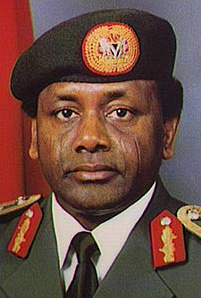
The 1993 presidential election held on June 12, was the first since the military coup of 1983. The results, though not officially declared by the National Electoral Commission, showed the duo of Moshood Abiola and Babagana Kingibe of the Social Democratic Party defeated Bashir Tofa and Slyvester Ugoh of the National Republican Convention by over 2.3 million votes. However, Babangida annulled the elections, leading to massive civilian protests that effectively shut down the country for weeks. In August 1993, Babangida finally kept his promise to relinquish power to a civilian government but not before appointing Ernest Shonekan head of the interim national government.[74] Babangida's regime has been considered the most corrupt and responsible for creating a culture of corruption in Nigeria.[75] Shonekan's interim government, the shortest in the political history of the country, was overthrown in a coup d'état of 1993 led by General Sani Abacha, who used military force on a wide scale to suppress the continuing civilian unrest.
In 1995, the government hanged environmentalist Ken Saro-Wiwa on trumped-up charges in the deaths of four Ogoni elders. Lawsuits under the American Alien Tort Statute against Royal Dutch Shell and Brian Anderson, the head of Shell's Nigerian operation, settled out of court with Shell continuing to deny liability.[76] Several hundred million dollars in accounts traced to Abacha were discovered in 1999.[77] The regime came to an end in 1998, when the dictator died in the villa. He looted money to offshore accounts in western European banks and defeated coup plots by arresting and bribing generals and politicians. His successor, General Abdulsalami Abubakar, adopted a new constitution on May 5, 1999, which provided for multiparty elections.
Fourth Republic (1999–present)

On May 29, 1999, Abubakar transferred power to the winner of the 1999 presidential election, former military ruler General Olusegun Obasanjo as the second democratically elected civilian President of Nigeria heralding the beginning of the Fourth Nigerian Republic.[78] This ended almost 33 years of military rule from 1966 until 1999, excluding the short-lived second republic (between 1979 and 1983) by military dictators who seized power in coups d'état and counter-coups.
Although the elections that brought Obasanjo to power and for a second term in the 2003 presidential election were condemned as unfree and unfair, Nigeria has shown marked improvements in attempts to tackle government corruption and hasten development.[79] Ethnic violence for control over the oil-producing Niger Delta region and an insurgency in the northeast are some of the issues facing the country. Umaru Yar'Adua of the People's Democratic Party came into power in the general election of 2007. The international community, which had been observing Nigerian elections to encourage a free and fair process, condemned this one as being severely flawed.[80] President Olusegun Obasanjo acknowledged fraud and other electoral "lapses" but said the result reflected opinion polls. In a national television address in 2007, he added that if Nigerians did not like the victory of his handpicked successor, they would have an opportunity to vote again in four years.[81] Yar'Adua died on May 5, 2010. Goodluck Jonathan was sworn in as Yar'Adua's successor,[82] becoming the 14th head of state.[83][84] Jonathan went on to win the 2011 presidential election, with the international media reporting the elections as having run smoothly with relatively little violence or voter fraud, in contrast to previous elections.[85]
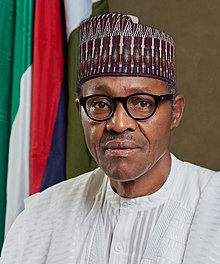
Ahead of the general election of 2015, a merger of the biggest opposition parties – the Action Congress of Nigeria, the Congress for Progressive Change, the All Nigeria Peoples Party (a faction of the All Progressives Grand Alliance), and the new PDP (a faction of serving governors of the ruling People's Democratic Party) – formed the All Progressives Congress. In the 2015 presidential election, former military head of state General Muhammadu Buhari – who had previously contested in the 2003, 2007, and 2011 presidential elections—defeated incumbent Jonathan of the People's Democratic Party by over two million votes, ending the party's sixteen year rule in the country and marking the first time in the history of Nigeria that an incumbent president lost to an opposition candidate. Observers generally praised the election as being fair. Jonathan was generally praised for conceding defeat and limiting the risk of unrest.[86][87][88][89] In the 2019 presidential election, Buhari was re-elected for a second term in office defeating his closet rival Atiku Abubakar.[90]
Politics

Nigeria is a federal republic modelled after the United States,[91] with executive power exercised by the President. The president is both head of state and head of the federal government; the president is elected by popular vote to a maximum of two four-year terms.[92] The president's power is checked by a Senate and a House of Representatives, which are combined in a bicameral body called the National Assembly. The Senate is a 109-seat body with three members from each state and one from the capital region of Abuja; members are elected by popular vote to four-year terms. The House contains 360 seats, with the number of seats per state determined by population.[92]
| Flag | Bicolour |
| Emblem | Coat of arms of Nigeria |
| Anthem | "Arise, O Compatriots" |
| Animal | Eagle |
| Bird | Black crowned crane |
| Flower | Costus spectabilis |
Ethnocentrism, tribalism, religious persecution, and prebendalism have plagued Nigerian politics both prior and subsequent to independence in 1960. All major parties have practised vote-rigging and other means of coercion to remain competitive. In the period before 1983 election, a report prepared by the National Institute of Policy and Strategic Studies showed that only the 1959 and 1979 elections were held without systemic rigging.[93] In 2012, Nigeria was estimated to have lost over $400 billion to corruption since independence.[94] Kin-selective altruism is prevalent in Nigerian politics, resulting in tribalist efforts to concentrate Federal power to a particular region of their interests.[95] Because of the above issues, Nigeria's political parties are pan-national and secular in character (though this does not preclude the continuing preeminence of the dominant ethnicities).[96][97] The two major political parties are the People's Democratic Party of Nigeria and the All Progressives Congress, with twenty registered minor opposition parties.
Hausa-Fulani, Yoruba and Igbo are the three largest ethnic groups in Nigeria and have maintained historical preeminence in Nigerian politics; competition amongst these three groups has fueled animosity.[96] Following the bloody civil war, nationalism has seen an increase in the southern part of the country leading to active secessionist movements such as the Oodua Peoples Congress and the Movement for the Actualization of the Sovereign State of Biafra, though these groups are generally small and not representative of the entire ethnic group.
Law
The country has a judicial branch, with the highest court being the Supreme Court of Nigeria.[92] There are three distinct systems of law in Nigeria:
- Common law, derived from its British colonial past, and a development of its own after independence;
- Customary law, derived from indigenous traditional norms and practice, including the dispute resolution meetings of pre-colonial Yorubaland secret societies such as the Oyo Mesi and Ogboni, as well as the Ekpe and Okonko of Igboland and Ibibioland;
- Sharia law, used only in the predominantly Muslim northern states of the country. It is an Islamic legal system that had been used long before the colonial administration.
Military


The Nigerian military is charged with protecting the Federal Republic of Nigeria, promoting Nigeria's global security interests, and supporting peacekeeping efforts, especially in West Africa. This is in support of the doctrine sometimes called Pax Nigeriana. The Nigerian Military consists of an army, a navy, and an air force.[92] The military in Nigeria has played a major role in the country's history since independence. Various juntas have seized control of the country and ruled it through most of its history. Its last period of military rule ended in 1999 following the sudden death of Sani Abacha in 1998. His successor, Abdulsalam Abubakar, handed over power to the democratically elected government of Olusegun Obasanjo the next year.
As Africa's most populated country, Nigeria has repositioned its military as a peacekeeping force on the continent. Since 1995, the Nigerian military, through ECOMOG mandates, have been deployed as peacekeepers in Liberia (1997), Ivory Coast (1997–1999), and Sierra Leone (1997–1999).[98] Under an African Union mandate, it has stationed forces in Sudan's Darfur region to try to establish peace. The Nigerian military has been deployed across West Africa, curbing terrorism in countries like Mali, Senegal, Chad, and Cameroon, as well as dealing with the Mali War, and getting Yahya Jammeh out of power in 2017.[citation needed]
Foreign relations
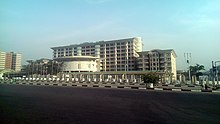
Upon gaining independence in 1960, Nigeria made African unity the centerpiece of its foreign policy and played a leading role in the fight against the apartheid government in South Africa.[99] One exception to the African focus was Nigeria's close relationship developed with Israel throughout the 1960s. Israel sponsored and oversaw the construction of Nigeria's parliament buildings.[100]
Nigeria's foreign policy was put to the test in the 1970s after the country emerged united from its own civil war. It supported movements against white minority governments in the Southern Africa sub-region. Nigeria backed the African National Congress by taking a committed tough line with regard to the South African government and their military actions in southern Africa. Nigeria was a founding member of the Organisation for African Unity (now the African Union) and has tremendous influence in West Africa and Africa on the whole. Nigeria founded regional cooperative efforts in West Africa, functioning as standard-bearer for the Economic Community of West African States (ECOWAS) and ECOMOG (especially during the Liberia and Sierra Leone civil wars) - which are economic and military organizations, respectively.
With this Africa-centered stance, Nigeria readily sent troops to the Congo at the behest of the United Nations shortly after independence (and has maintained membership since that time). Nigeria also supported several Pan-African and pro-self government causes in the 1970s, including garnering support for Angola's MPLA, SWAPO in Namibia, and aiding opposition to the minority governments of Portuguese Mozambique, and Rhodesia. Nigeria retains membership in the Non-Aligned Movement. In late November 2006, it organised an Africa-South America Summit in Abuja to promote what some attendees termed "South-South" linkages on a variety of fronts.[101] Nigeria is also a member of the International Criminal Court, and the Commonwealth of Nations. It was temporarily expelled from the latter in 1995 when ruled by the Abacha regime.
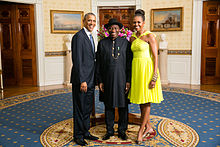
Nigeria has remained a key player in the international oil industry since the 1970s and maintains membership in OPEC, which it joined in July 1971. Its status as a major petroleum producer figures prominently in its sometimes volatile international relations with developed countries, notably the United States, and with developing countries.[102]
Since 2000, China-Nigerian trade relations have risen exponentially. There has been an increase in total trade of over 10,384 million dollars between the two nations from 2000 to 2016.[103] However the structure of the China-Nigerian trade relationship has become a major political issue for the Nigerian state. This is illustrated by the fact that Chinese exports account for around 80 percent of total bilateral trade volumes.[104] This has resulted in a serious trade imbalance, with Nigeria importing ten times more than it exports to China.[105] Subsequently, Nigeria's economy is becoming over-reliant on cheap foreign imports to sustain itself, resulting in a clear decline in Nigerian Industry under such arrangements.[106]
Continuing its Africa-centered foreign policy, Nigeria introduced the Idea of a single currency for West Africa known as the Eco under the presumption that it would be led by the naira, but on December 21, 2019; Ivorian President Alassane OuattaraI along with Emmanuel Macron and multiple other UEMOA States, announced that they would merely rename the CFA franc instead of replacing the currency as originally intended. As of 2020, the Eco currency has been delayed to 2025.[107]
Administrative divisions

Nigeria is divided into thirty-six states and one Federal Capital Territory, which are further sub-divided into 774 local government areas. In some contexts, the states are aggregated into six geopolitical zones: North West, North East, North Central, South West, South East, and South South.[108][109]
Nigeria has five cities with a population of over a million (from largest to smallest): Lagos, Kano, Ibadan, Benin City and Port Harcourt. Lagos is the largest city in Africa, with a population of over 12 million in its urban area.[110]
Geography
Nigeria is located in western Africa on the Gulf of Guinea and has a total area of 923,768 km2 (356,669 sq mi),[111] making it the world's 32nd-largest country. Its borders span 4,047 kilometres (2,515 mi), and it shares borders with Benin (773 km or 480 mi), Niger (1,497 km or 930 mi), Chad (87 km or 54 mi), and Cameroon (including the separatist Ambazonia) 1,690 km or 1,050 mi. Its coastline is at least 853 km (530 mi).[112] Nigeria lies between latitudes 4° and 14°N, and longitudes 2° and 15°E. The highest point in Nigeria is Chappal Waddi at 2,419 m (7,936 ft). The main rivers are the Niger and the Benue, which converge and empty into the Niger Delta. This is one of the world's largest river deltas, and the location of a large area of Central African mangroves.
Nigeria's most expansive topographical region is that of the valleys of the Niger and Benue river valleys (which merge and form a Y-shape).[113] To the southwest of the Niger is "rugged" highland. To the southeast of the Benue are hills and mountains, which form the Mambilla Plateau, the highest plateau in Nigeria. This plateau extends through the border with Cameroon, where the montane land is part of the Bamenda Highlands of Cameroon.
Climate
Nigeria has a varied landscape. The far south is defined by its tropical rainforest climate, where annual rainfall is 60 to 80 inches (1,500 to 2,000 mm) per year.[114] In the southeast stands the Obudu Plateau. Coastal plains are found in both the southwest and the southeast.[113] Mangrove swamps are found along the coast.[115]
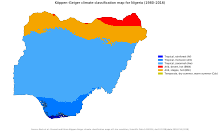
The area near the border with Cameroon close to the coast is rich rainforest and part of the Cross-Sanaga-Bioko coastal forests ecoregion, an important centre for biodiversity. It is habitat for the drill primate, which is found in the wild only in this area and across the border in Cameroon. The areas surrounding Calabar, Cross River State, also in this forest, are believed to contain the world's largest diversity of butterflies. The area of southern Nigeria between the Niger and the Cross Rivers has lost most of its forest because of development and harvesting by increased population, with it being replaced by grassland.
Everything in between the far south and the far north is savannah (insignificant tree cover, with grasses and flowers located between trees). Rainfall is more limited to between 500 and 1,500 millimetres (20 and 60 in) per year.[114] The savannah zone's three categories are Guinean forest-savanna mosaic, Sudan savannah, and Sahel savannah. Guinean forest-savanna mosaic is plains of tall grass interrupted by trees. Sudan savannah is similar but with shorter grasses and shorter trees. Sahel savannah consists of patches of grass and sand, found in the northeast.[115] In the Sahel region, rain is less than 500 millimetres (20 in) per year, and the Sahara Desert is encroaching.[114] In the dry northeast corner of the country lies Lake Chad, which Nigeria shares with Niger, Chad and Cameroon.
Plant ecology
Nigeria has numerous tree species, of which the majority of them are native while few are exotic. A high percentage of man-made forests in the country is dominated with exotic species.[116] This culminated from the assumption that exotic trees are fast-growing. However, studies have also investigated the growth of indigenous trees in with that of exotic species. Due to overexploitation, the remaining natural ecosystems and primary forests in Nigeria are restricted to the protected areas which include one biosphere reserve, seven national parks, one World Heritage site, 12 Strict Nature Reserves (SNRs), 32 game reserves/wildlife sanctuaries, and hundreds of forest reserves. These are in addition to several ex-situ conservation sites such as arboreta, botanical gardens, zoological gardens, and gene banks managed by several tertiary and research institutions[117]
Many countries in Africa are affected by Invasive Alien Species (IAS). In 2004, the IUCN–World Conservation Union identified 81 IAS in South Africa, 49 in Mauritius, 37 in Algeria and Madagascar, 35 in Kenya, 28 in Egypt, 26 in Ghana and Zimbabwe, and 22 in Ethiopia.[118] However, very little is known about IAS in Nigeria, with most technical reports and literatures reporting fewer than 10 invasive plants in the country. Aside from plant invaders, Rattus rattus and Avian influenza virus were also considered IAS in Nigeria.[119] The initial entry of IAS into Nigeria was mainly through exotic plant introductions by the colonial rulers either for forest tree plantations or for ornamental purposes. The entry of exotic plants into Nigeria during the post-independence era was encouraged by increasing economic activity, the commencement of commercial oil explorations, introduction through ships, and introduction of ornamental plants by commercial floriculturists.[119]

In the semi-arid and dry sub-humid savannas of West Africa, including Nigeria, numerous species of herbaceous dicots especially from the genera Crotalaria, Alysicarpus, Cassia and Ipomea are known to be widely used in livestock production. Quite often they are plucked or cut, and fed either as fresh or conserved fodders. The utilization of these and many other herbs growing naturally within the farm environment is opportunistic.[117]
Many other species native to Nigeria, including soybean and its varieties, serve as an important source of oil and protein in this region.[citation needed] There are also many plants with medicinal purposes that are used to aid the therapy in many organs. Some of these vegetations include, Euphorbiaceae, that serve purposed to aid malaria, gastrointestinal disorders and many other infections. Different stress factors such as droughts, low soil nutrients and susceptibility to pests has contributed to Maize plantations being an integral part of agriculture in this region.[120]
As industrialization has increased, it has also put species of trees in the forest at risk to air pollution and studies have shown that in certain parts of Nigeria, trees have shown tolerance and grow in areas that have a significant amount air pollution[121]
Environmental issues


Nigeria's Delta region, home of the large oil industry, experiences serious oil spills and other environmental problems, which has caused conflict in the Delta region.
Waste management including sewage treatment, the linked processes of deforestation and soil degradation, and climate change or global warming are the major environmental problems in Nigeria. Waste management presents problems in a megacity like Lagos and other major Nigerian cities which are linked with economic development, population growth and the inability of municipal councils to manage the resulting rise in industrial and domestic waste. This waste management problem is also attributable to unsustainable environmental management lifestyles of Kubwa community in the Federal Capital Territory, where there are habits of indiscriminate disposal of waste, dumping of waste along or into the canals, sewerage systems that are channels for water flows, and the like. Haphazard industrial planning, increased urbanisation, poverty and lack of competence of the municipal government are seen as the major reasons for high levels of waste pollution in major cities of the country. Some of the solutions have been disastrous to the environment, resulting in untreated waste being dumped in places where it can pollute waterways and groundwater.[122]
In 2005, Nigeria had the highest rate of deforestation in the world, according to the Food and Agriculture Organization of the United Nations.[123] That year, 12.2%, the equivalent of 11,089,000 hectares had been forested in the country. Between 1990 and 2000, Nigeria lost an average of 409,700 hectares of forest every year equal to an average annual deforestation rate of 2.4%. Between 1990 and 2005, in total Nigeria lost 35.7% of its forest cover, or around 6,145,000 hectares.[124] Nigeria had a 2019 Forest Landscape Integrity Index mean score of 6.2/10, ranking it 82nd globally out of 172 countries.[125]
In 2010, thousands of people were inadvertently exposed to lead-containing soil from informal gold mining within the northern state of Zamfara. While estimates vary, it is thought that upwards of 400 children died of acute lead poisoning, making this perhaps the largest lead poisoning fatality outbreak ever encountered.[126]
Economy




Nigeria's mixed economy is the largest in Africa, the 26th-largest in the world by nominal GDP, and 25th-largest by PPP. It is a lower-middle-income economy,[127] with its abundant supply of natural resources, well-developed financial, legal, communications, transport sectors and Nigerian Stock Exchange. Economic development has been hindered by years of military rule, corruption, and mismanagement. The restoration of democracy and subsequent economic reforms have successfully put Nigeria back on track towards achieving its full economic potential. Next to petroleum, the second-largest source of foreign exchange earnings for Nigeria are remittances sent home by Nigerians living abroad.[128]
During the oil boom of the 1970s, Nigeria accumulated a significant foreign debt to finance major infrastructural investments. With the fall of oil prices during the 1980s oil glut, Nigeria struggled to keep up with its loan payments and eventually defaulted on its principal debt repayments, limiting repayment to the interest portion of the loans. Arrears and penalty interest accumulated on the unpaid principal, which increased the size of the debt. After negotiations by the Nigerian authorities, in October 2005 Nigeria and its Paris Club creditors reached an agreement under which Nigeria repurchased its debt at a discount of approximately 60%. Nigeria used part of its oil profits to pay the residual 40%, freeing up at least $1.15 billion annually for poverty reduction programmes. Nigeria made history in April 2006 by becoming the first African country to completely pay off its debt (estimated $30 billion) owed to the Paris Club.[citation needed]
Agriculture

As of 2010, about 30% of Nigerians are employed in agriculture.[129] Agriculture used to be the principal foreign exchange earner of Nigeria.[130] Major crops include beans, sesame, cashew nuts, cassava, cocoa beans, groundnuts, gum arabic, kolanut, maize (corn), melon, millet, palm kernels, palm oil, plantains, rice, rubber, sorghum, soybeans and yams.[131] Cocoa is the leading non-oil foreign exchange earner.[131] Rubber is the second-largest non-oil foreign exchange earner.[131]
Prior to the Nigerian civil war, Nigeria was self-sufficient in food.[131] Agriculture has failed to keep pace with Nigeria's rapid population growth, and Nigeria now relies upon food imports to sustain itself.[131] The Nigerian government promoted the use of inorganic fertilizers in the 1970s.[132] In August 2019, Nigeria closed its border with Benin and other neighbouring countries to stop rice smuggling into the country as part of efforts to boost the local production.[133]
Petroleum and mining
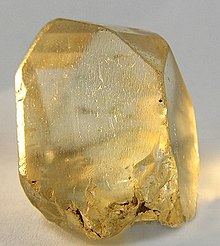
Nigeria is the 12th largest producer of petroleum in the world, the 8th largest exporter, and has the 10th largest proven reserves. Petroleum plays a large role in the Nigerian economy, accounting for 40% of GDP and 80% of government earnings. However, agitation for better resource control in the Niger Delta, its main oil-producing region, has led to disruptions in oil production and prevents the country from exporting at 100% capacity.[134]

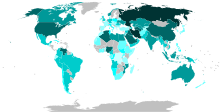
The Niger Delta Nembe Creek oil field was discovered in 1973 and produces from middle Miocene deltaic sandstone-shale in an anticline structural trap at a depth of 2 to 4 kilometres (7,000 to 13,000 feet).[135] In June 2013, Shell announced a strategic review of its operations in Nigeria, hinting that assets could be divested. While many international oil companies have operated there for decades, by 2014 most were making moves to divest their interests, citing a range of issues including oil theft. In August 2014, Shell Oil Company said it was finalising its interests in four Nigerian oil fields.[136]
Nigeria has a total of 159 oil fields and 1,481 wells in operation according to the Department of Petroleum Resources.[137] The most productive region of the nation is the coastal Niger Delta Basin in the Niger Delta or "south-south" region which encompasses 78 of the 159 oil fields. Most of Nigeria's oil fields are small and scattered, and as of 1990, these small fields accounted for 62.1% of all Nigerian production. This contrasts with the sixteen largest fields which produced 37.9% of Nigeria's petroleum at that time.[138]
In addition to its petroleum resources, Nigeria also has a wide array of underexploited mineral resources which include natural gas, coal, bauxite, tantalite, gold, tin, iron ore, limestone, niobium, lead and zinc.[139] Despite huge deposits of these natural resources, the mining industry in Nigeria is still in its infancy.
Services and tourism
Nigeria has a highly developed financial services sector, with a mix of local and international banks, asset management companies, brokerage houses, insurance companies and brokers, private equity funds and investment banks.[140] Nigeria has one of the fastest-growing telecommunications markets in the world, major emerging market operators (like MTN, 9mobile, Airtel and Globacom) basing their largest and most profitable centres in the country.[141] Nigeria's ICT sector has experienced a lot of growth, representing 10% of the nation's GDP in 2018 as compared to just 1% in 2001.[142] Lagos is regarded as one of the largest technology hubs in Africa with its thriving tech ecosysytem.[143] Several startups like Paystack, Interswitch, Bolt and Piggyvest are leveraging technology to solve issues across different sectors.
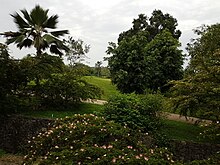
Tourism in Nigeria centers largely on events, because of the country's ample amount of ethnic groups, but also includes rain forests, savannah, waterfalls, and other natural attractions.[144]

Abuja is home to several parks and green areas. The largest, Millennium Park, was designed by architect Manfredi Nicoletti and officially opened in December 2003. Subsequent to the re-modernization project achieved by the administration of Governor Raji Babatunde Fashola, Lagos is gradually becoming a major tourist destination. Lagos is currently taking steps to become a global city. The 2009 Eyo carnival (a yearly festival originated from Iperu Remo, Ogun State) was a step toward world city status. Currently, Lagos is primarily known as a business-oriented and a fast-paced community.[145] Lagos has become an important location for African and black cultural identity.[146]
Many festivals are held in Lagos; festivals vary in offerings each year and may be held in different months. Some of the festivals are Festac Food Fair held in Festac Town Annually, Eyo Festival, Lagos Black Heritage Carnival, Lagos Carnival, Eko International Film Festival, Lagos Seafood Festac Festival, LAGOS PHOTO Festival and the Lagos Jazz Series, which is a unique franchise for high-quality live music in all genres with a focus on jazz. Established in 2010, the event takes place over a 3- to 5-day period at selected high-quality outdoor venues. The music is as varied as the audience itself and features a diverse mix of musical genres from rhythm and blues to soul, Afrobeat, hip hop, bebop, and traditional jazz. The festivals provide entertainment of dance and song to add excitement to travelers during a stay in Lagos.
Lagos has sandy beaches by the Atlantic Ocean, including Elegushi Beach and Alpha Beach. Lagos also has many private beach resorts including Inagbe Grand Beach Resort and several others in the outskirts. Lagos has a variety of hotels ranging from three-star to five-star hotels, with a mixture of local hotels such as Eko Hotels and Suites, Federal Palace Hotel and franchises of multinational chains such as Intercontinental Hotel, Sheraton, and Four Points by Hilton. Other places of interest include the Tafawa Balewa Square, Festac town, The Nike Art Gallery, Freedom Park, and the Cathedral Church of Christ.
Manufacturing and technology

Nigeria has a manufacturing industry that includes leather and textiles (centred in Kano, Abeokuta, Onitsha, and Lagos). Nigeria currently has an indigenous auto manufacturing company, Innoson Vehicle Manufacturing[147] located in Nnewi. It produces buses and SUVs. Car manufacturing (for the French car manufacturer Peugeot as well as for the English truck manufacturer Bedford, now a subsidiary of General Motors), T-shirts, plastics and processed food. In this regard, some foreign vehicle manufacturing companies like Nissan have made known their plans to have manufacturing plants in Nigeria.[148] Ogun is considered to be Nigeria's current industrial hub, as most factories are located in Ogun and more companies are moving there, followed by Lagos.[149][150][151]
Nigeria has a few electronic manufacturers like Zinox, the first branded Nigerian computer, and manufacturers of electronic gadgets such as tablet PCs.[152] In 2013, Nigeria introduced a policy regarding import duty on vehicles to encourage local manufacturing companies in the country.[153][154] The city of Aba in the south-eastern part of the country is well known for handicrafts and shoes, known as "Aba made".[155]
Infrastructure
Energy

Nigeria's primary energy consumption was about 108 Mtoe in 2011. Most of the energy comes from traditional biomass and waste, which account for 83% of total primary production. The rest is from fossil fuels (16%) and hydropower (1%). Since independence, Nigeria has tried to develop a domestic nuclear industry for energy. Since 2004, Nigeria has a Chinese-origin research reactor at Ahmadu Bello University and has sought the support of the International Atomic Energy Agency to develop plans for up to 4,000 MWe of nuclear capacity by 2027 according to the National Program for the Deployment of Nuclear Power for Generation of Electricity. In 2007, President Umaru Yar'Adua urged the country to embrace nuclear power in order to meet its growing energy needs. In 2017, Nigeria signed the UN treaty on the Prohibition of Nuclear Weapons.[156]
In April 2015, Nigeria began talks with Russia's state-owned Rosatom to collaborate on the design, construction and operation of four nuclear power plants by 2035, the first of which will be in operation by 2025. In June 2015, Nigeria selected two sites for the planned construction of the nuclear plants. Neither the Nigerian government nor Rosatom would disclose the specific locations of the sites, but it is believed that the nuclear plants will be sited in Akwa Ibom State and Kogi State. The sites are planned to house two plants each. In 2017 agreements were signed for the construction of the Itu nuclear power plant.
Transportation
Nigeria suffers from lack of adequate transportation infrastructure. As of 1999, its 194,394 kilometres of road networks are the main means of transportation, of which 60,068 kilometres (37,325 mi) (including 1,194 km (742 mi) of expressways) are paved roads and 134,326 kilometres are unpaved roads of city, town and village roads. The railways have undergone a massive revamping with projects such as the Lagos-Kano Standard Gauge Railway being completed connecting northern cities of Kano, Kaduna, Abuja, Ibadan and Lagos.
There are 54 airports in Nigeria; the principal airports are Murtala Muhammed International Airport in Lagos and Nnamdi Azikiwe International Airport in Abuja. Three other international airports are Mallam Aminu Kano International Airport in Kano, Akanu Ibiam International Airport in Enugu and Port Harcourt International Airport in Port Harcourt. As with other transportation facilities, the airports suffer from a poor reputation for safety and operational efficiency.
Telecommunications
According to the National Bureau of Statistics in 2020, Nigeria has about 136,203,231 million internet users out of an estimated population of 205,886,311.[157] This implies that as of 2020, 66 percent of the Nigerian population are connected to the internet and using it actively. Although Nigerians are using the internet for educational, social networking, and entertainment purposes, the internet has also become a tool for mobilizing political protests in Nigeria. However, the Nigerian government has become threatened by how its citizens are using the internet to influence governance and political changes. Using various measures including but not limited to Illegal arrest, taking down of websites, passport seizures, and restricted access to bank accounts, the Nigerian Government punishes citizens for expressing themselves on the internet and working to stifle internet freedom.[158]
Due to how the Nigerian government is responding to internet freedom among other things such as limitations to internet access and violations of users rights, Nigeria ranked 26th out of the 65 countries evaluated for internet freedom in the Freedom House 2020 Index.[159]
Government satellites

The government has recently begun expanding this infrastructure to space-based communications. Nigeria has a space satellite that is monitored at the Nigerian National Space Research and Development Agency Headquarters in Abuja. The Nigerian government has commissioned the overseas production and launch of four satellites.
NigComSat-1 was the first Nigerian satellite built, was Nigeria's third satellite, and Africa's first communication satellite. It was launched in 2007 aboard a Chinese Long March 3B carrier rocket, from the Xichang Satellite Launch Center in China. The spacecraft was operated by NigComSat and the Nigerian Space Research and Development Agency. On November 11, 2008, NigComSat-1 failed in orbit after running out of power because of an anomaly in its solar array. It was based on the Chinese DFH-4 satellite bus and carries a variety of transponders: four C-band; fourteen Ku-band; eight Ka-band; and two L-band. It was designed to provide coverage to many parts of Africa, and the Ka-band transponders would also cover Italy. The satellite was launched from Russia on September 27, 2003. Nigeriasat-1 was part of the worldwide Disaster Monitoring Constellation System.[160] The primary objectives of the Nigeriasat-1 were: to give early warning signals of environmental disaster; to help detect and control desertification in the northern part of Nigeria; to assist in demographic planning; to establish the relationship between malaria vectors and the environment that breeds malaria and to give early warning signals on future outbreaks of meningitis using remote sensing technology; to provide the technology needed to bring education to all parts of the country through distant learning; and to aid in conflict resolution and border disputes by mapping out state and International borders.
NigeriaSat-2, Nigeria's second satellite, was built as a high-resolution earth satellite by Surrey Space Technology Limited, a United Kingdom-based satellite technology company. It has 2.5-metre resolution panchromatic (very high resolution), 5-metre multispectral (high resolution, NIR red, green and red bands), and 32-metre multispectral (medium resolution, NIR red, green and red bands) antennas, with a ground receiving station in Abuja. The NigeriaSat-2 spacecraft alone was built at a cost of over £35 million. This satellite was launched into orbit from a military base in China.[161] On 10 November 2008 (0900 GMT), the satellite was reportedly switched off for analysis and to avoid a possible collision with other satellites. According to Nigerian Communications Satellite Limited, it was put into "emergency mode operation in order to effect mitigation and repairs".[162] The satellite eventually failed after losing power on 11 November 2008. On 24 March 2009, the Nigerian Federal Ministry of Science and Technology, NigComSat Ltd. and CGWIC signed another contract for the in-orbit delivery of the NigComSat-1R satellite. NigComSat-1R was also a DFH-4 satellite, and the replacement for the failed NigComSat-1 was successfully launched into orbit by China in Xichang on 19 December 2011.[163][164] The satellite, was stated to have a positive impact on national development in various sectors such as communications, internet services, health, agriculture, environmental protection and national security.[165]
NigeriaEduSat-1 was a satellite designed, built, and owned by the Federal University of Technology Akure (FUTA), in conjunction with Nigeria's National Space Research and Development Agency and Japan's Kyushu Institute of Technology. It was equipped with 0.3 megapixel and 5 megapixel cameras, and with the rest of the satellite fleet took images of Nigeria. The satellite transmitted songs and poems as an outreach project to generate Nigerian interest in science. The signal could be received by amateur radio operators. The satellite constellation also conducted measurements of the atmospheric density 400 kilometres (250 mi) above the Earth. The satellite cost about US$500,000 to manufacture and launch.
Demographics

| Population in Nigeria[166][167] | |||
|---|---|---|---|
| Year | Million | ||
| 1971 | 55 | ||
| 1980 | 71 | ||
| 1990 | 95 | ||
| 2000 | 125 | ||
| 2004 | 138 | ||
| 2008 | 151 | ||
| 2012 | 167 | ||
| 2016 | 186 | ||
| 2017 | 191 | ||
The United Nations estimates that the population of Nigeria in 2018 was at 195,874,685[168][169], distributed as 51.7% rural and 48.3% urban, and with a population density of 167.5 people per square kilometre. Around 42.5% of the population were 14 years or younger, 19.6% were aged 15–24, 30.7% were aged 25–54, 4.0% aged 55–64, and 3.1% aged 65 years or older. The median age in 2017 was 18.4 years.[170] Nigeria is the seventh most populous country in the world. The birth rate is 35.2-births/1,000 population and the death rate is 9.6 deaths/1,000 population as of 2017, while the total fertility rate is 5.07 children born/woman.[170] Nigeria's population increased by 57 million from 1990 to 2008, a 60% growth rate in less than two decades.[171] Nigeria is the most populous country in Africa and accounts for about 17% of the continent's total population as of 2017; however, exactly how populous is a subject of speculation.[172]
National census results in the past few decades have been disputed. The results of the most recent census were released in December 2006 and gave a population of 140,003,542. The only breakdown available was by gender: males numbered 71,709,859, females numbered 68,293,008. According to the United Nations, Nigeria has been undergoing explosive population growth and has one of the highest growth and fertility rates in the world. By their projections, Nigeria is one of eight countries expected to account collectively for half of the world's total population increase in 2005–2050.[173] The UN estimates that by 2100 the Nigerian population will be between 505 million and 1.03 billion people (middle estimate: 730 million).[174] In 1950, Nigeria had only 33 million people. In 2012, President Goodluck Jonathan said Nigerians should limit their number of children.[175]
Millions of Nigerians have emigrated during times of economic hardship, primarily to Europe, North America and Australia. It is estimated that over a million Nigerians have emigrated to the United States and constitute the Nigerian American populace. Individuals in many such Diasporic communities have joined the "Egbe Omo Yoruba" society, a national association of Yoruba descendants in North America.[176][177] Nigeria's largest city is Lagos. Lagos has grown from about 300,000 in 1950[178] to an estimated 13.4 million in 2017.[179]
Ethnic groups
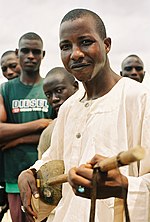
|

|

|
| A Hausa lute player | Igbo Chief | Yoruba drummers |
Nigeria has more than 250 ethnic groups, with varying languages and customs, creating a country of rich ethnic diversity. The three largest ethnic groups are the Hausa, Yoruba and Igbo, together accounting for more than 70% of the population, while the Edo, Ijaw, Fulɓe, Kanuri, Urhobo-Isoko, Ibibio, Ebira, Nupe, Gbagyi, Jukun, Igala, Idoma and Tiv comprise between 25 and 30%; other minorities make up the remaining 5%.[180] The Middle Belt of Nigeria is known for its diversity of ethnic groups, including the Atyap, Berom, Goemai, Igala, Kofyar, Pyem, and Tiv. The official population count of each of Nigeria's ethnicities is disputed as members of different ethnic groups believe the census is rigged to give a particular group (usually believed to be northern groups) numerical superiority.[110][181][182]
There are small minorities of British, American, Indian, Chinese (est. 50,000),[183] white Zimbabwean,[184] Japanese, Greek, Syrian and Lebanese immigrants. Immigrants also include those from other West African or East African nations. These minorities mostly reside in major cities such as Lagos and Abuja, or in the Niger Delta as employees for the major oil companies. A number of Cubans settled in Nigeria as political refugees following the Cuban Revolution.
In the middle of the 19th century, a number of ex-slaves of Afro-Cuban and Afro-Brazilian descent[185] and emigrants from Sierra Leone established communities in Lagos and other regions of Nigeria. Many ex-slaves came to Nigeria following the emancipation of slaves in the Americas. Many of the immigrants, sometimes called Saro (immigrants from Sierra Leone) and Amaro (ex-slaves from Brazil)[186] later became prominent merchants and missionaries in these cities.
Languages
This section needs additional citations for verification. (July 2018) |

There are 521 languages that have been spoken in Nigeria; nine of them are extinct.[dubious ] In some areas of Nigeria, ethnic groups speak more than one language. The official language of Nigeria, English, was chosen to facilitate the cultural and linguistic unity of the country, owing to the influence of British colonisation which ended in 1960. Many French speakers from surrounding countries have influenced the English spoken in the border regions of Nigeria and some Nigerian citizens have become fluent enough in French to work in the surrounding countries. The French spoken in Nigeria may be mixed with some native languages. French may also be mixed with English.
The major languages spoken in Nigeria represent three major families of languages of Africa: the majority are Niger-Congo languages, such as Igbo, Yoruba, Ijaw, Fulfulde, Ogoni, and Edo. Kanuri, spoken in the northeast, primarily in Borno and Yobe State, is part of the Nilo-Saharan family, and Hausa is an Afroasiatic language. Even though most ethnic groups prefer to communicate in their own languages, English as the official language is widely used for education, business transactions and for official purposes. English as a first language is used by only a small minority of the country's urban elite, and it is not spoken at all in some rural areas. Hausa is the most widely spoken of the three main languages spoken in Nigeria.
With the majority of Nigeria's populace in the rural areas, the major languages of communication in the country remain indigenous languages. Some of the largest of these, notably Yoruba and Igbo, have derived standardised languages from several different dialects and are widely spoken by those ethnic groups. Nigerian Pidgin English, often known simply as "Pidgin" or "Broken" (Broken English), is also a popular lingua franca, though with varying regional influences on dialect and slang. The pidgin English or Nigerian English is widely spoken within the Niger Delta Region.[187]
Religion
Nigeria is a religiously diverse society, with Islam and Christianity being the most widely professed religions. Nigerians are nearly equally divided into Muslims and Christians, with a tiny minority of adherents of traditional African religions and other religions.[189] The Christian share of Nigeria's population is on decline because of lower fertility rate compared to Muslims in the north.[190] As in other parts of Africa where Islam and Christianity are dominant, religious syncretism with the traditional African religions is common.[191]
A 2012 report on religion and public life by the Pew Research Center stated that in 2010, 49.3 percent of Nigeria's population was Christian, 48.8 percent was Muslim, and 1.9 percent were followers of indigenous and other religions, or unaffiliated.[192] However, in a report released by Pew Research Center in 2015, the Muslim population was estimated to be 50%, and by 2060, according to the report, Muslims will account for about 60% of the country.[193] The 2010 census of Association of Religion Data Archives has also reported that 48.8% of the total population was Christian, slightly larger than the Muslim population of 43.4%, while 7.5% were members of other religions.[194] However, these estimates should be taken with caution because sample data is mostly collected from major urban areas in the south, which are predominantly Christian.[195][196][197]
Islam dominates North Western Nigeria (Hausa, Fulani and others), with 99% Muslim, and a good portion of Northern Eastern Nigeria (Kanuri, Fulani and other groups) Nigeria. In the west, the Yoruba tribe is predominantly split between Muslims and Christians with 10% adherents of traditional religions. Protestant and locally cultivated Christianity are widely practised in Western areas, while Roman Catholicism is a more prominent Christian feature of South Eastern Nigeria. Both Roman Catholicism and Protestantism are observed in the Ibibio, Anaang, Efik, Ijo and Ogoni lands of the south. The Igbos (predominant in the east) and the Ijaw (south) are 98% Christian, with 2% practising traditional religions.[198] The middle belt of Nigeria contains the largest number of minority ethnic groups in Nigeria, who were found to be mostly Christians and members of traditional religions, with a small proportion of Muslims.[199]
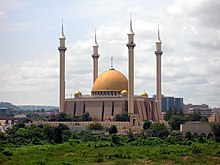
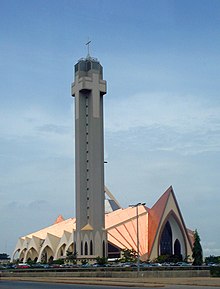
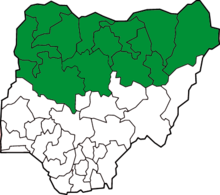
Nigeria has the largest Muslim population in sub-Saharan Africa. The vast majority of Muslims in Nigeria are Sunni belonging to Maliki school of jurisprudence; however, a sizeable minority also belongs to Shafi Madhhab. A large number of Sunni Muslims are members of Sufi brotherhoods. Most Sufis follow the Qadiriyya, Tijaniyyah and/or the Mouride movements. A significant Shia minority exists. Some northern states have incorporated Sharia law into their previously secular legal systems, which has brought about some controversy.[200] Kano State has sought to incorporate Sharia law into its constitution.[201] The majority of Quranists follow the Kalo Kato or Quraniyyun movement. There are also Ahmadiyya and Mahdiyya minorities,[202] as well as followers of the Baháʼí Faith.[203][204]
Among Christians, the Pew Research survey found that 74% were Protestant, 25% were Catholic, and 1% belonged to other Christian denominations, including a small Orthodox Christian community.[205] Leading Protestant churches in the country include the Church of Nigeria of the Anglican Communion, the Assemblies of God Church, the Nigerian Baptist Convention and The Synagogue, Church Of All Nations. Since the 1990s, there has been significant growth in many other churches, independently started in Africa by Africans, particularly the evangelical Protestant ones. These include the Redeemed Christian Church of God, Winners' Chapel, Christ Apostolic Church (the first Aladura Movement in Nigeria), Living Faith Church Worldwide, Deeper Christian Life Ministry, Evangelical Church of West Africa, Mountain of Fire and Miracles, Christ Embassy, Lord's Chosen Charismatic Revival Movement, Celestial Church of Christ, and Dominion City.[206] In addition, The Church of Jesus Christ of Latter-day Saints, the Aladura Church, the Seventh-day Adventist and various indigenous churches have also experienced growth.[207][208] The Yoruba area contains a large Anglican population, while Igboland is a mix of Roman Catholics, Protestants, and a small population of Igbo Jews. The Edo area is composed predominantly of members of the Assemblies of God, which was introduced into Nigeria by Augustus Ehurie Wogu and his associates at Old Umuahia.
Nigeria has become an African hub for the Grail Movement and the Hare Krishnas,[209] and the largest temple of the Eckankar religion is in Port Harcourt, Rivers State, with a total capacity of 10,000.
Health

Health care delivery in Nigeria is a concurrent responsibility of the three tiers of government in the country, and the private sector.[210] Nigeria has been reorganising its health system since the Bamako Initiative of 1987, which formally promoted community-based methods of increasing accessibility of drugs and health care services to the population, in part by implementing user fees.[211] The new strategy dramatically increased accessibility through community-based health care reform, resulting in more efficient and equitable provision of services. A comprehensive approach strategy was extended to all areas of health care, with subsequent improvement in the health care indicators and improvement in health care efficiency and cost.[212]
HIV/AIDS rate in Nigeria is much lower compared to the other African nations such as Botswana or South Africa whose prevalence (percentage) rates are in the double digits. As of 2019, the HIV prevalence rate among adults ages 15–49 was 1.5 percent.[213] The life expectancy in Nigeria is 54.7 years on average,[213] and 71% and 39% of the population have access to improved water sources and improved sanitation, respectively.[214] As of 2019, the infant mortality is 74.2 deaths per 1,000 live births.[215]
In 2012, a new bone marrow donor program was launched by the University of Nigeria to help people with leukaemia, lymphoma, or sickle cell disease to find a compatible donor for a life-saving bone marrow transplant, which cures them of their conditions. Nigeria became the second African country to have successfully carried out this surgery.[216] In the 2014 Ebola outbreak, Nigeria was the first country to effectively contain and eliminate the Ebola threat that was ravaging three other countries in the West African region; the unique method of contact tracing employed by Nigeria became an effective method later used by countries such as the United States, when Ebola threats were discovered.[217][218][219]
The Nigerian health care system is continuously faced with a shortage of doctors known as 'brain drain', because of emigration by skilled Nigerian doctors to North America and Europe. In 1995, an estimated 21,000 Nigerian doctors were practising in the United States alone, which is about the same as the number of doctors working in the Nigerian public service. Retaining these expensively trained professionals has been identified as one of the goals of the government.[220]
Education

Education in Nigeria is overseen by the Ministry of Education. Local authorities take responsibility for implementing policy for state-controlled public education and state schools at a regional level. The education system is divided into kindergarten, primary education, secondary education and tertiary education. After the 1970s oil boom, tertiary education was improved so it would reach every subregion of Nigeria. 68% of the Nigerian population is literate, and the rate for men (75.7%) is higher than that for women (60.6%).[221]
Nigeria provides free, government-supported education, but attendance is not compulsory at any level, and certain groups, such as nomads and the handicapped, are under-served. The education system consists of six years of primary school, three years of junior secondary school, three years of senior secondary school, and four, five or six years of university education leading to a bachelor's degree.[221] The government has majority control of university education. Tertiary education in Nigeria consists of universities (public and private), polytechnics, monotechnics, and colleges of education. The country has a total of 138 universities, with 40 federally owned, 39 state owned, and 59 privately owned.
Crime
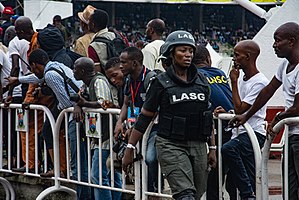
Nigeria is home to a substantial network of organised crime, active especially in drug trafficking, shipping heroin from Asian countries to Europe and America; and cocaine from South America to Europe and South Africa.[222] Various Nigerian confraternities or student "campus cults" are active in both organised crime and in political violence as well as providing a network of corruption within Nigeria. As confraternities have extensive connections with political and military figures, they offer excellent alumni networking opportunities. The Supreme Vikings Confraternity, for example, boasts that twelve members of the Rivers State House of Assembly are cult members.[223] In lower levels of society, there are the "area boys", organised gangs mostly active in Lagos who specialise in mugging and small-scale drug dealing. Gang violence in Lagos resulted in 273 civilians and 84 policemen killed in the period of August 2000 to May 2001.[224]
There is some piracy in the Gulf of Guinea, with attacks directed at all types of vessels. Consistent with the rise of Nigeria as an increasingly dangerous hot spot, 28 of the 30 seafarers kidnapped globally between January and June 2013 were in Nigeria.[225]
Internationally, Nigeria is infamous for a form of bank fraud dubbed 419, a type of advance-fee scam (named after Section 419 of the Nigerian Penal Code) along with the "Nigerian scam", a form of confidence trick practised by individuals and criminal syndicates.[226] These scams involve a complicit Nigerian bank (the laws being set up loosely to allow it) and a scammer who claims to have money he needs to obtain from that bank. The victim is talked into exchanging bank account information on the premise that the money will be transferred to them and they will get to keep a cut. In reality, money is taken out instead, and/or large fees (which seem small in comparison with the imaginary wealth to be gained) are deducted. In 2003, the Nigerian Economic and Financial Crimes Commission was created to combat this and other forms of organised financial crime,[227] and in some cases, it has succeeded in bringing the crime bosses to justice and even managing to return the stolen money to victims.[228]
Nigeria has been pervaded by political corruption.[229] Nigeria was ranked 136 out of 182 countries in Transparency International's 2014 Corruption Perceptions Index.[230] More than $400 billion were stolen from the treasury by Nigeria's leaders between 1960 and 1999.[231] In 2015, incumbent President Muhammadu Buhari said corrupt officials have stolen $150 billion from Nigeria in the last 10 years.[232]
Poverty
Nigeria poverty rates have gone down significantly in the 2010s because of economic growth. The World Bank states Nigeria has had a 7.4% economic growth in July 2019 which has been their highest yet since the gross domestic product rate decreased to 2%. While as of May 4, 2020, 40% of Nigerians live in poverty, this number still shows the growth of the developing country, with a previously counted 61% of the population living in poverty in 2012. Having made their own plans to reduce this number, Nigeria has presented a plan to the World Bank Group to lower this number tremendously. Government instability, which affects the rate at which citizens are employed, is the major reason for the poverty levels being higher in certain periods of time.
Human rights
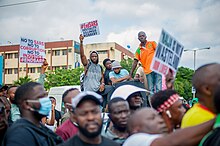

Nigeria's human rights record remains poor.[233] According to the U.S. Department of State,[233] the most significant human rights problems are: use of excessive force by security forces; impunity for abuses by security forces; arbitrary arrests; prolonged pretrial detention; judicial corruption and executive influence on the judiciary; rape, torture and other cruel, inhuman or degrading treatment of prisoners, detainees and suspects; harsh and life‑threatening prison and detention centre conditions; human trafficking for the purpose of prostitution and forced labour; societal violence and vigilante killings; child labour, child abuse and child sexual exploitation; domestic violence; discrimination based on ethnicity, region and religion.
Nigeria is a state party of the Convention on the Elimination of All Forms of Discrimination Against Women[234] It also has signed Maputo Protocol, an international treaty on women's rights, and the African Union Women's Rights Framework.[235] Discrimination based on sex is a significant human rights issue. Forced marriages are common.[236] Child marriage remains common in Northern Nigeria;[237] 39% of girls are married before age 15, although the Marriage Rights Act banning marriage of girls below 18 years old was introduced on a federal level in 2008.[238] There is rampant polygamy in Northern Nigeria.[239] Submission of the wife to her husband and domestic violence are common. Women have less land rights.[240] Maternal mortality was at 814 per 100,000 live births in 2015.[241] Female genital mutilation is common, although a ban was implemented in 2015.[242] In Nigeria, at least half a million suffer from vaginal fistula, largely as a result of lack of medical care.[243][244] Early marriages can result in fistula.[245]
Women face a large amount of inequality politically in Nigeria, being subjugated to a bias which is sexist and reinforced by socio-cultural, economic and oppressive ways.[246] Women throughout the country were only politically emancipated in 1979.[247] Yet husbands continue to dictate the votes for many women in Nigeria, which upholds the patriarchal system.[248] Most workers in the informal sector are women.[249] Women's representation in government since independence from Britain is very poor. Women have been reduced to sideline roles in appointive posts throughout all levels in government and still make up a tiny minority of elected officials.[248] But nowadays with more education available to the public, Nigerian women are taking steps to have more active roles in the public, and with the help of different initiatives, more businesses are being started by women.
Under the Shari'a penal code that applies to Muslims in twelve northern states, offences such as alcohol consumption, homosexuality,[250] infidelity and theft carry harsh sentences, including amputation, lashing, stoning and long prison terms.[251] According to 2013 survey by the Pew Research Center, 98% of Nigerians believe homosexuality should not be accepted by society.[252]
Culture
Literature

Nigerian citizens have authored many influential works of post-colonial literature in the English language. Nigeria's best-known writers are Wole Soyinka, the first African Nobel Laureate in Literature, and Chinua Achebe, best known for the novel Things Fall Apart (1958) and his controversial critique of Joseph Conrad. Other Nigerian writers and poets who are well known internationally include John Pepper Clark, Ben Okri, Cyprian Ekwensi, Buchi Emecheta, Helon Habila, T. M. Aluko, Isaac Delano, Chimamanda Ngozi Adichie, Daniel O. Fagunwa, Femi Osofisan and Ken Saro-Wiwa, who was executed in 1995 by the military regime. Critically acclaimed writers of a younger generation include Adaobi Tricia Nwaubani, Chris Abani, Sefi Atta, Helon Habila, Helen Oyeyemi, Nnedi Okorafor, Kachi A. Ozumba, Sarah Ladipo Manyika, and Chika Unigwe.
Music and film

Nigeria has had a huge role in the development of various genres of African music, including West African Highlife, Palm-wine music, JuJu, Afrobeat, Afrobeats, which fuses native rhythms with techniques that have been linked to the Congo, Brazil, Cuba, Jamaica and worldwide.
Many late 20th-century musicians such as Fela Kuti have famously fused cultural elements of various indigenous music with American jazz and soul to form Afrobeat which has in turn influenced hip hop music.[254] JuJu music, which is percussion music fused with traditional music from the Yoruba nation and made famous by King Sunny Adé, is from Nigeria. Fuji music, a Yoruba percussion style, was created and popularised by Mr. Fuji, Alhaji Sikiru Ayinde Barrister.
Afan Music was invented and popularised by the Ewu-born poet and musician Umuobuarie Igberaese. There is a budding hip-hop movement in Nigeria. Kennis Music, the self-proclaimed number-one record label in Africa, and one of Nigeria's biggest record labels, has a roster almost entirely dominated by hip-hop artists. In November 2008, Nigeria's music scene (and that of Africa) received international attention when MTV hosted the continent's first African music awards show in Abuja.[255] Additionally, the first music video played on MTV Base Africa (the 100th station on the MTV network) was Tuface Idibia's pan-African hit "African Queen".
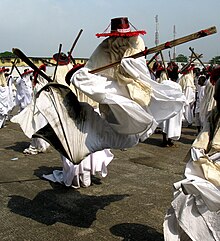
Notable musicians from Nigeria include: Sade Adu, King Sunny Adé, Onyeka Onwenu, Dele Sosimi, Adewale Ayuba, Ezebuiro Obinna, Ebenezer Obey, Femi Kuti, Lagbaja, Dr. Alban, Bola Abimbola, Tuface Idibia, Aṣa, Nneka, Wale, P Square, Wizkid, Skepta, Davido, Burna Boy and D'Banj.
The Nigerian film industry is known as Nollywood (a blend of Nigeria and Hollywood[256]) and is now the 2nd-largest producer of movies in the world after India's Bollywood. Nigerian film studios are based in Lagos, Kano and Enugu, forming a major portion of the local economy of these cities. Nigerian cinema is Africa's largest movie industry in terms of both value and the number of movies produced per year. Although Nigerian films have been produced since the 1960s, the country's film industry has been aided by the rise of affordable digital filming and editing technologies.
The 2009 thriller film The Figurine heightened the media attention towards New Nigerian Cinema revolution. The film was a critical and commercial success in Nigeria, and it was also screened in international film festivals.[257] The 2010 film Ijé by Chineze Anyaene, overtook The Figurine to become the highest grossing Nigerian film; a record it held for four years, until it was overtaken in 2014 by Half of a Yellow Sun(2013).[258][259] By 2016, this record was held by The Wedding Party, a film by Kemi Adetiba.
By the end of 2013, the film industry reportedly hit a record-breaking revenue of ₦1.72 trillion (US$11 billion). As of 2014, the industry was worth ₦853.9 billion (US$5.1 billion) making it the third most valuable film industry in the world, behind the United States and India. It contributed about 1.4% to Nigeria's economy; this was attributed to the increase in the number of quality films produced and more formal distribution methods.[260][261]
T.B. Joshua's Emmanuel TV, originating from Nigeria, is one of the most viewed television stations across Africa.[262]
There are many festivals in Nigeria, some of which date to the period before the arrival of the major religions in this ethnically and culturally diverse society. The main Muslim and Christian festivals are often celebrated in ways that are unique to Nigeria or unique to the people of a locality.[263] The Nigerian Tourism Development Corporation has been working with the states to upgrade the traditional festivals, which may become important sources of tourism revenue.[264]
Cuisine
Nigerian cuisine, like West African cuisine in general, is known for its richness and variety. Many different spices, herbs, and flavourings are used in conjunction with palm oil or groundnut oil to create deeply flavoured sauces and soups often made very hot with chili peppers. Nigerian feasts are colourful and lavish, while aromatic market and roadside snacks cooked on barbecues or fried in oil are plentiful and varied.[265]
Sport
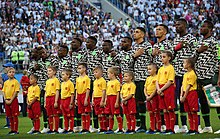
Football is largely considered Nigeria's national sport, and the country has its own Premier League of football. Nigeria's national football team, known as the "Super Eagles", has made the World Cup on six occasions 1994, 1998, 2002, 2010, 2014, and 2018. In April 1994, the Super Eagles ranked 5th in the FIFA World Rankings, the highest ranking achieved by an African football team. They won the African Cup of Nations in 1980, 1994, and 2013, and have also hosted the U-17 & U-20 World Cup. They won the gold medal for football in the 1996 Summer Olympics (in which they beat Argentina) becoming the first African football team to win gold in Olympic football.
The nation's 1993 cadet team from produced some international players notably Nwankwo Kanu, a two-time African footballer of the year who won the European Champions League with Ajax Amsterdam and later played with Inter Milan, Arsenal, West Bromwich Albion and Portsmouth. Other players who graduated from the junior teams are Nduka Ugbade, Jonathan Akpoborie, Victor Ikpeba, Celestine Babayaro, Wilson Oruma and Taye Taiwo. Some other famous Nigerian footballers include Mikel John Obi, Obafemi Martins, Vincent Enyeama, Yakubu, Rashidi Yekini, Peter Odemwingie and Jay-Jay Okocha.

Nigeria is also involved in other sports such as basketball, cricket and track and field.[266] Boxing is also an important sport in Nigeria; Dick Tiger and Samuel Peter are both former World Champions. In March 2021, the global governing body FIBA ranked Nigeria as Africa's top men's basketball nation.[267] Nigeria's national basketball team made the headlines internationally when it qualified for the 2012 Summer Olympics as it beat heavily favoured world elite teams such as Greece and Lithuania.[268] Nigeria has been home to numerous internationally recognised basketball players in the world's top leagues in America, Europe and Asia. These players include Basketball Hall of Famer Hakeem Olajuwon, and later NBA draft picks Solomon Alabi, Yinka Dare, Obinna Ekezie, Festus Ezeli, Al-Farouq Aminu, Olumide Oyedeji and others. The Nigerian Premier League has become one of the biggest and most-watched basketball competitions in Africa. The games have aired on Kwese TV and have averaged a viewership of over a million people.[269]
Nigeria made history by qualifying the first bobsled team for the Winter Olympics from Africa when their women's two-person team qualified for the bobsled competition at the XXIII Olympic Winter Games.[270] In the early 1990s, Scrabble was made an official sport in Nigeria. By the end of 2017, there were around 4,000 players in more than 100 clubs in the country.[271] In 2015, Wellington Jighere became the first African player to win World Scrabble Championship.[272] In 2018, the Nigerian Curling Federation was established to introduce a new sport to the country with the hopes to get the game apart of the curriculum at the elementary, high school, and university level. At the 2019 World Mixed Doubles Curling Championship in Norway, Nigeria won their first international match beating France 8–5.[273]
Nigeria featured women's and men's national teams in beach volleyball that competed at the 2018–2020 CAVB Beach Volleyball Continental Cup.[274]
See also
- Index of Nigeria-related articles
- Outline of Nigeria
- Telephone numbers in Nigeria
- Deportation of West African migrants from Nigeria
References
- ^ "Languages of Nigeria". Ethnologue. Retrieved 12 September 2010.
- ^ "Africa: Nigeria". The World Factbook. Central Intelligence Agency. Retrieved 21 June 2020.
- ^ "Nigeria Population Growth Rate 1950-2021". macrotrends. Retrieved 21 June 2021.
- ^ Jump up to: a b "World Economic Outlook Database, October 2020 – Nigeria". International Monetary Fund. Retrieved 15 October 2020.
- ^ "Poverty and Inequality Index". National Bureau of Statistics. Retrieved 8 June 2020.
- ^ Human Development Report 2020 The Next Frontier: Human Development and the Anthropocene (PDF). United Nations Development Programme. 15 December 2020. pp. 343–346. ISBN 978-92-1-126442-5. Retrieved 16 December 2020.
- ^ Akinbode, Ayomide (2 April 2019). "Why Nigeria changed from Right-Hand Drive to Left-Hand Drive in 1972". www.thehistoryville.com. Retrieved 9 July 2021.
The terms 'right- and left-hand drive' refer to the position of the driver in the vehicle and are the reverse of the terms 'right- and left-hand traffic'.
- ^ Achebe, Nwando. The female king of colonial Nigeria : Ahebi Ugbabe. Bloomington. ISBN 978-0-253-00507-6. OCLC 707092916.
- ^ "Nigeria's Buhari wins historic election landslide". Reuters. 31 March 2015. Retrieved 25 May 2020.
- ^ "Ethnicity in Nigeria". PBS. 5 April 2007. Retrieved 9 May 2015.
- ^ "Nigeria". Ethnologue. Retrieved 4 July 2019.
- ^ Pereltsvaig, Asya (16 June 2011). "Linguistic diversity in Africa and Europe – Languages Of The World". Archived from the original on 15 May 2012. Retrieved 4 July 2019.
- ^ "NIGERIA – CIA WORLD FACTBOOK 2019" (PDF).
- ^ Mann, Charles C. (1990). "Choosing an Indigenous Official Language for Nigeria" (PDF).
- ^ "Nigerian Constitution". Nigeria Law. Retrieved 17 July 2015.
- ^ "The countries with the 10 largest Christian populations and the 10 largest Muslim populations". Pew Research Center. Retrieved 25 May 2020.
- ^ "Nigeria Fact Sheet" (PDF). United States Embassy in Nigeria. Retrieved 23 September 2018.
- ^ "Nigeria: The African giant". The Round Table. 50 (197): 55–63. 1959. doi:10.1080/00358535908452221.
- ^ Campbell, John (29 January 2020). "Perceptions of Corruption in Nigeria Remain High, According to NGO". Council on Foreign Relations. Retrieved 12 April 2021.
- ^ "A light shines on Nigerian corruption". The Christian Science Monitor. 16 October 2020. Retrieved 12 April 2020.
- ^ The Arabic name nahr al-anhur is a direct translation of the Tuareg.
- ^ "Online Etymological Dictionary". Etymonline.com. Retrieved 28 July 2014.
- ^ Breunig, Peter. 2014. Nok: African Sculpture in Archaeological Context: p. 21.
- ^ Nicole Rupp, Peter Breunig & Stefanie Kahlheber, "Exploring the Nok Enigma", Antiquity 82.316, June 2008.
- ^ B.E.B. Fagg, "The Nok Culture in Prehistory", Journal of the Historical Society of Nigeria 1.4, December 1959.
- ^ Kleiner, Fred S.; Christin J. Mamiya (2009). Gardner's Art Through the Ages: Non-Western Perspectives (13, revised ed.). Cengage Learning. p. 194. ISBN 978-0-495-57367-8.
- ^ "Nok Terracottas (500 B.C.–200 A.D.) | Thematic Essay | Heilbrunn Timeline of Art History | The Metropolitan Museum of Art". Metmuseum.org. 2 June 2014. Retrieved 16 July 2014.
- ^ Tylecote 1975 (see below)
- ^ Eggert, Manfred (2014). "Early iron in West and Central Africa". In Breunig, P (ed.). Nok: African Sculpture in Archaeological Context. Frankfurt, Germany: Africa Magna Verlag Press. pp. 51–59.
- ^ Eggert, Manfred (2014). "Early iron in West and Central Africa". In Breunig, P (ed.). Nok: African Sculpture in Archaeological Context. Frankfurt, Germany: Africa Magna Verlag Press. pp. 53–54. ISBN 9783937248462.
- ^ Eze–Uzomaka, Pamela. "Iron and its influence on the prehistoric site of Lejja". Academia.edu. University of Nigeria, Nsukka, Nigeria. Retrieved 12 December 2014.
- ^ Jump up to: a b Juang, Richard M. (2008). Africa and the Americas: culture, politics, and history: a multidisciplinary encyclopedia, Volume 2. ABC-CLIO. p. 597. ISBN 978-1-85109-441-7.
- ^ Hrbek, Ivan (1992). Africa from the seventh to the eleventh Century. James Currey Publishers. p. 254. ISBN 978-0-85255-093-9.
- ^ Uzukwu, E. Elochukwu (1997). Worship as Body Language. Liturgical Press. p. 93. ISBN 978-0-8146-6151-2.
- ^ Jump up to: a b Falola, Toyin; Heaton, Matthew M. (2008). A History of Nigeria. Cambridge University Press. p. 23. ISBN 978-0-521-68157-5.
- ^ Laitin, David D. (1986). Hegemony and culture: politics and religious change among the Yoruba. University of Chicago Press. p. 111. ISBN 978-0-226-46790-0.
- ^ MacDonald, Fiona; Paren, Elizabeth; Shillington, Kevin; Stacey, Gillian; Steele, Philip (2000). Peoples of Africa, Volume 1. Marshall Cavendish. p. 385. ISBN 978-0-7614-7158-5.
- ^ Jump up to: a b c Gordon, April A. (2003). Nigeria's Diverse Peoples: A Reference Sourcebook. ABC-CLIO. pp. 44–54. ISBN 978-1-57607-682-8. Retrieved 29 March 2015.
- ^ Jump up to: a b c Falola, Toyin; Genova, Ann (2009). Historical Dictionary of Nigeria. Scarecrow Press. p. 328. ISBN 978-0-8108-6316-3. Retrieved 29 March 2015.
- ^ Falola, Toyin; Paddock, Adam (2012). Environment and Economics in Nigeria. Routledge. p. 78. ISBN 978-1-136-66247-8. Retrieved 29 March 2015.
- ^ Metz, Helen Chapin (1991). "Nigeria: A Country Study – The Slave Trade". Library of Congress Country Studies. Retrieved 28 May 2011.
- ^ Kevin Shillington, Encyclopedia of African History. (U of Michigan Press, 2005) p. 1401.
- ^ Abba Idris Adam, "Re-inventing Islamic Civilization in the Sudanic Belt: The Role of Sheikh Usman Dan Fodio." Journal of Modern Education Review 4.6 (2014): 457–465. online
- ^ Derek R. Peterson, ed., Abolitionism and imperialism in Britain, Africa, and the Atlantic (Ohio UP, 2010).
- ^ Toyin Falola and Matthew M. Heaton, A History of Nigeria (2008) pp 85–109.
- ^ "Slow death slavery course abolition northern Nigeria 18971936 | Regional history after 1500". Cambridge University Press. Retrieved 22 January 2020.
- ^ "The end of slavery". The Story of Africa. BBC News. Retrieved 28 May 2011.
- ^ Udofia, O.E. (1981). "Nigerian Political Parties: Their Role in Modernizing the Political System, 1920–1966". Journal of Black Studies. 11 (4): 435–447. doi:10.1177/002193478101100404. JSTOR 2784073. S2CID 143073983.
- ^ Falola and Heaton, A History of Nigeria (2008) pp 158–59.
- ^ Murray, Senan (30 May 2007). "Reopening Nigeria's civil war wounds". BBC News. Retrieved 28 May 2011.
- ^ Daly, Samuel Fury Childs (7 August 2020). A History of the Republic of Biafra. Cambridge University Press. doi:10.1017/9781108887748. ISBN 978-1-108-88774-8.
- ^ "Background Paper on Nigeria and Biafra, Declassified Documents Reference System.
- ^ Metz, Helen Chapin (1991). "Nigeria: A Country Study – Civil War". Library of Congress Country Studies. Retrieved 28 May 2011.
- ^ "The Biafra War and the Age of Pestilence". Litencyc.com. Retrieved 28 July 2014.
- ^ Michael I. Draper, Shadows: Airlift and Airwar in Biafra and Nigeria 1967–1970.
- ^ McDonald, Gordon C., Area Handbook for the Democratic Republic of the Congo (Congo Kinshasa) (1971), p. 263
- ^ Stearns, Jason K. Dancing in the Glory of Monsters: The Collapse of the Congo and the Great War of Africa (2011), p. 115
- ^ Wrong, Michela. In the Footsteps of Mr. Kurtz: Living on the Brink of Disaster in Mobutu's Congo (2000), p. 266
- ^ Watts, Michael (1987) State, Oil and Agriculture in Nigeria, Institute of International Studies, University of California, ISBN 0-87725-166-5.
- ^ Iliffe 2011, pp. 42–43; Erfler 2011, p. 81.
- ^ Erfler 2011, p. 82.
- ^ Iliffe 2011, p. 43; Erfler 2011, p. 81.
- ^ Iliffe 2011, p. 44.
- ^ Iliffe 2011, p. 48.
- ^ Iliffe 2011, pp. 48-49; Erfler 2011, p. 85.
- ^ Iliffe 2011, p. 50; Erfler 2011, p. 85.
- ^ African Concord (1990). The New Helmsmen. Concord Press, Ikeja, Lagos. August 13, 1990
- ^ David Williams, President and power in Nigeria: The life of Shehu Shagari (Routledge, 2018).
- ^ Nnamdi J.O. Ijeaku (2009). The Igbo and their Niger Delta Neighbors: We Are No Second Fools. Xlibris. p. 193. ISBN 978-1-4628-0861-8.
- ^ "Nigeria, Military Faces Daunting Challenges", AP Press International, 3 March 1984. Retrieved 22 February 2007.
- ^ "Nigeria stays calms as leader toppled in bloodless coup", The Globe and Mail, 28 August 1985. Retrieved 22 February 2007.
- ^ Siollun, Max (25 October 2018), Levan, Carl; Ukata, Patrick (eds.), "Civil Military Affairs and Military Culture in Post-Transition Nigeria", The Oxford Handbook of Nigerian Politics, Oxford University Press, pp. 272–287, doi:10.1093/oxfordhb/9780198804307.013.13, ISBN 978-0-19-880430-7
- ^ Holman, Michael (24 February 1986) "Nigeria, Politics; Religious Differences Intensify", Financial Times
- ^ Bilski, Andrew, "Broken Promises", Maclean, 6 September 1993.
- ^ Diamond, Larry; Kirk-Greene, Anthony; Oyeleye Oyediran (1997) Transition without End: Nigerian Politics and Civil Society Under Babangida, Vantage Publishers, ISBN 978-2458-54-6.
- ^ "Wiwa et al v. Royal Dutch Petroleum et al". Center for Constitutional Rights.
- ^ "Nigerian Lawyer: Abacha accounts apparently in Switzerland, Luxembourg, France, and Germany", AP press, 10 January 2000.
- ^ "Abdusalam Abubakar", Encyclopædia Britannica Online, accessed 26 October 2012.
- ^ Falola and Heaton, A History of Nigeria (2008) pp. 211–34.
- ^ "Final Report" (PDF). EU Election Observation Mission Nigeria 2007. Archived from the original (PDF) on 16 February 2008. Retrieved 24 January 2008.
- ^ McGreal, Chris (24 April 2007). "Ruling party named winner in disputed Nigerian election". The Guardian. London. Retrieved 21 November 2008.
- ^ "Nigeria's Goodluck Jonathan sworn in as president". BBC News. 6 May 2010. Retrieved 28 May 2011.
- ^ "NASS confirms Sambo as vice president". . 18 May 2010. Retrieved 29 May 2011.
- ^ Akinlade, Muruf (18 May 2010). "National Assembly confirms Sambo as Vice President". MyOndoState.Com. Archived from the original on 27 April 2011. Retrieved 29 May 2011.
- ^ Nossiter, Adam (16 April 2011). "Nigerians Vote in Presidential Election". The New York Times. Retrieved 17 April 2011.
- ^ "Nigeria election: Muhammadu Buhari wins". BBC. Retrieved 31 March 2015.
- ^ "Obama praises Nigeria's president for conceding defeat". Vanguard. 1 April 2015. Retrieved 4 April 2015.
- ^ "APC praises Jonathan for conceding defeat". The Nation. Retrieved 4 April 2015.
- ^ "Anyaoku Praises Jonathan For Conceding Defeat". Channels Television. 31 March 2015. Retrieved 4 April 2015.
- ^ AfricaNews (27 February 2019). "Buhari beats Atiku to secure re-election as Nigeria president". Africanews. Retrieved 5 July 2020.
- ^ Charles Mwalimu. The Nigerian Legal System: Public Law. Peter Lang. 2005. p. 6.
- ^ Jump up to: a b c d "Nigeria". The World Factbook. Central Intelligence Agency (United States).
- ^ Ibrahim, Jibrin (2006) "Legislation and the Electoral Process: The Third Term Agenda and the Future of Nigerian Democracy". Paper for Centre for Democracy and Development (CDD) Nigeria Roundtable.
- ^ "Nigeria has lost $400bn oil revenue to corruption since Independence – Ezekwesili". Daily Post Nigeria. 31 August 2012.
- ^ Johnson Aguiyi-Ironsi, who served briefly as Nigeria's second president, devoted his government to combating this phenomenon with Decree 33, which banned 81 political parties and 26 tribal and cultural organizations in the name of national unity. See Osaghae, The Crippled Giant: Nigeria Since Independence, Indiana University Press, 1998, p. 57. ISBN 0-253-21197-2.
- ^ Jump up to: a b Rashid, Khadijat K. (2003). "Ethnicity and Sub-Nationalism in Nigeria: Movement for a Mid-West State/Ethnic Politics in Kenya and Nigeria/Federalism and Ethnic Conflict in Nigeria". African Studies Review. 46 (2).
- ^ Lancia, Nicole. "Ethnic Politics in Nigeria: The Realities of Regionalism". Georgetown University. Archived from the original on 8 February 2012. Retrieved 28 May 2011.
- ^ O'Loughlin, Ed (11 March 1998) "Nigerians outshine the British brass", The Independent (London)
- ^ Young, Andrew (20 July 2006) "Collins Edomaruse, how Obasanjo cut UK, US to size", This Day (Nigeria).
- ^ Burkett, Elinor (2009) Golda, HarperCollins, ISBN 0-06-187395-0, p. 202.
- ^ "ASAS – Africa-South America Summit". African Union. 30 November 2006. Archived from the original on 18 May 2011. Retrieved 29 May 2011.
- ^ Timothy, Shaw (1984). "The State of Nigeria: Oil Prices Power Bases and Foreign Policy". Canadian Journal of African Studies. 18 (2): 393–405. doi:10.2307/484337. JSTOR 484337.
- ^ LeVan, Carl; Ukata, Patrick (2018). The Oxford Handbook of Nigerian Politics. Oxford: Oxford University Press. p. 751. ISBN 978-0-19-880430-7.
- ^ LeVan, Carl; Ukata, Patrick (2018). The Oxford Handbook of Nigerian Politics. Oxford: Oxford University Press. p. 756. ISBN 978-0-19-880430-7.
- ^ LeVan, Carl; Ukata, Patrick (2018). The Oxford Handbook of Nigerian Politics. Oxford: Oxford University Press. p. 754. ISBN 978-0-19-880430-7.
- ^ LeVan, Carl; Ukata, Patrick (2018). The Oxford Handbook of Nigerian Politics. Oxford: Oxford University Press. p. 754–755. ISBN 978-0-19-880430-7.
- ^ Smith, Elliot (29 September 2020). "West Africa's new currency could now be delayed by five years". CNBC. Retrieved 17 November 2020.
- ^ "Constitution amendment: What the people want". 4 November 2012. Retrieved 14 December 2012.
- ^ "Constitutional review: Nigeria needs broader representation". 6 December 2012. Archived from the original on 11 May 2013. Retrieved 14 December 2012.
- ^ Jump up to: a b Onuah, Felix (29 December 2006). "Nigeria gives census result, avoids risky details". Reuters. Retrieved 23 November 2008.
- ^ "Rank Order – Area". The World Factbook. Central Intelligence Agency. Retrieved 29 May 2011.
- ^ "Africa :: Nigeria". The World Factbook. Central Intelligence Agency. 17 May 2011. Retrieved 29 May 2011. *Note that coastlines, and borders based on rivers or natural features, are fractals, the length of which is imprecise and depends on the measurement convention adopted.
- ^ Jump up to: a b "Nigeria". Encarta. Microsoft. Archived from the original on 11 November 2003. Retrieved 19 July 2007.
- ^ Jump up to: a b c "Regions Used to Interpret the Complexity of Nigeria". Geographical Alliance of Iowa. University of Northern Iowa. Archived from the original on 14 April 2009. Retrieved 19 July 2007.
- ^ Jump up to: a b "The Human and Physical Characteristics of Nigeria". Geographical Alliance of Iowa. University of Northern Iowa. Archived from the original on 28 March 2010. Retrieved 13 August 2007.
- ^ Onefeli, Alfred; Adesoye, Peter (23 June 2014). "Early Growth Assessment of Selected Exotic and Indigenous Tree Species in Nigeria". South-East European Forestry. 5 (1): 45–51. doi:10.15177/seefor.14-06. ISSN 1847-6481.
- ^ Jump up to: a b Kallah, Muh. S; Bale, J. O; Abdullahi, U. S; Muhammad, I. R; Lawal, R (10 April 2000). "Nutrient composition of native forbs of semi-arid and dry sub-humid savannas of Nigeria". Animal Feed Science and Technology. 84 (1): 137–145. doi:10.1016/S0377-8401(99)00131-5. ISSN 0377-8401.
- ^ "GISD". www.iucngisd.org. Retrieved 16 March 2020.
- ^ Jump up to: a b United Nations Environment Programme (UNEP). Invasive Alien Species. In: African Environment Outlook 2: Our Environment, Our Wealth
- ^ Olaoye, G (15 February 2010). "Evaluation of new generations of maize streak virus (msv) resistant varieties for grain yield, agronomic potential and adaptation to a southern guinea savanna ecology of Nigeria". Agro-Science. 8 (2). doi:10.4314/as.v8i2.51107. ISSN 1119-7455.
- ^ Agbaire, P. O.; Esiefarienrhe, E. (2009). "Air Pollution tolerance indices (apti) of some plants around Otorogun Gas Plant in Delta State, Nigeria". Journal of Applied Sciences and Environmental Management. 13 (1). doi:10.4314/jasem.v13i1.55251. ISSN 1119-8362.
- ^ Ogbonna, D.N.; Ekweozor, I.K.E.; Igwe, F.U. (2002). "Waste Management: A Tool for Environmental Protection in Nigeria". AMBIO: A Journal of the Human Environment. 31 (1): 55–57. doi:10.1639/0044-7447(2002)031[0055:wmatfe]2.0.co;2. JSTOR 4315211.
- ^ "News.mongabay.com". News.mongabay.com. Retrieved 28 July 2014.
- ^ "Rainforest analysis at Mongabay.com". Rainforests.mongabay.com. 1 January 2010. Retrieved 28 July 2014.
- ^ Grantham, H. S.; et al. (2020). "Anthropogenic modification of forests means only 40% of remaining forests have high ecosystem integrity - Supplementary Material". Nature Communications. 11 (1): 5978. doi:10.1038/s41467-020-19493-3. ISSN 2041-1723. PMC 7723057. PMID 33293507.
- ^ Bashir, Muhammed; Umar-Tsafe, Nasir; Getso, Kabiru; Kaita, Ibrahim M.; Nasidi, Abdulsalami; Sani-Gwarzo, Nasir; Nguku, Patrick; Davis, Lora; Brown, Mary Jean (18 April 2014). "Assessment of blood lead levels among children aged ≤ 5 years—Zamfara State, Nigeria, June–July 2012". MMWR. Morbidity and Mortality Weekly Report. 63 (15): 325–327. ISSN 1545-861X. PMC 5779393. PMID 24739340.
- ^ "World Bank list of economies". http: www.worldbank.org. January 2011. Archived from the original on 22 May 2011. Retrieved 27 May 2011.
- ^ Gbola Subair- Abuja (8 September 2014). "Remittances from diaspora Nigerians as lubricant for the economy". Nigerian Tribune. Archived from the original on 17 March 2015. Retrieved 17 April 2015.
- ^ "Labour Force Statistics, 2010". Nigerian Bureau of Statistics. 2010. Archived from the original on 24 April 2015. Retrieved 22 June 2015.
- ^ Ake, Claude (1996). Democracy and Development in Africa. Brookings Institution Press. p. 48. ISBN 978-0-8157-0220-7. Retrieved 26 December 2008.
- ^ Jump up to: a b c d e "Agriculture – Nigeria – export, growth, area, crops, farming, sector". Retrieved 17 April 2015.
- ^ Pasquini, MW; Alexander, MJ (2005). "Soil fertility management strategies on the Jos Plateau: the need for integrating 'empirical' and 'scientific' knowledge in agricultural development". Geographical Journal. 171 (2): 112–124. doi:10.1111/j.1475-4959.2005.00154.x.
- ^ "Nigeria closes part of border with Benin to check rice smuggling". Reuters. 29 August 2019. Archived from the original on 29 August 2019. Retrieved 29 August 2019.
- ^ Williams, Lizzie (2008). Nigeria: The Bradt Travel Guide. Bradt Travel Guides. p. 26. ISBN 978-1-84162-239-2. Retrieved 26 December 2008.
- ^ Nelson, P.H.H., Role of Reflection Seismic in Development of Nembe Creek Field, Nigeria, 1980, in Giant Oil and Gas Fields of the Decade: 1968–1978, AAPG Memoir 30, Halbouty, M.T., editor, Tulsa: American Association of Petroleum Geologists, ISBN 0-89181-306-3, pp. 565–576
- ^ "Stakes in four Nigerian oil fields being sold by Shell". Nigeria Sun. 27 August 2014. Retrieved 28 August 2014.
- ^ Environmental Resources Managers Ltd, Niger Delta Environmental Survey Final Report Phase I; Volume I: Environmental and Socio-Economic Characteristics (Lagos: Niger Delta Environmental Survey, September 1997)
- ^ Nigeria: The Political Economy of Oil ISBN 0-19-730014-6 (Khan, Ahmad)
- ^ Safire, William, The New York Times (2007). The New York Times Guide to Essential Knowledge: A Desk Reference for the Curious Mind. Macmillan. p. 1093. ISBN 978-0-312-37659-8.
- ^ Lewis, Peter (2007). Growing Apart: Oil, Politics, and Economic Change in Indonesia and Nigeria. University of Michigan Press. p. 168. ISBN 978-0-472-06980-4. Retrieved 26 December 2008.
- ^ DeRouen, Karl R. & Bellamy, Paul (2008). International Security and the United States: An Encyclopedia. Greenwood Publishing Group. p. 546. ISBN 978-0-275-99253-8. Retrieved 26 December 2008.
- ^ "The New Economy of Africa". Center For Global Development.
- ^ "Africa's Booming Tech Hubs Are "Backbone of Tech Ecosystem" Having Grown 40% This Year". Forbes. Retrieved 24 January 2020.
- ^ Archibong, Maurice (18 March 2004). "Nigeria: Gold mine waiting to be tapped". The Sun Online. The Sun Publishing Ltd. Archived from the original on 26 April 2007. Retrieved 21 June 2007.
- ^ "Managing Metropolitan Lagos" (PDF). R.Rasaki. Archived from the original (PDF) on 13 May 2012. Retrieved 4 April 2012.
- ^ Anthony Appiah; Henry Louis Gates (2010). Encyclopedia of Africa, Volume 2. Oxford University Press. p. 53. ISBN 978-0-19-533770-9.
- ^ "5 Advantages Of Driving An Innoson Vehicle". Innoson Vehicle Manufacturing. 18 December 2018. Retrieved 22 January 2020.
- ^ Agande, Ben (24 January 2014). "Nissan to role out 1st made in Nigeria cars in April". Vanguard, Nigeria. Vanguard. Retrieved 14 March 2014.
- ^ "Industrial hub: Why more companies are moving to Ogun". Vanguard Nigeria. 19 June 2013. Retrieved 14 March 2014.
- ^ "Ogun State's rising investment profile". Daily NewsWatch. 5 May 2013. Archived from the original on 14 March 2014. Retrieved 14 March 2014.
- ^ "Ogun State: Nigeria's new Industrial hub". Online Nigeria News. 27 November 2012. Retrieved 14 March 2014.
- ^ Okonji, Emma (24 October 2013). "Zinox Introduces Tablet Range of Computers, Plans Commercial Launch". This Day. This Day Live. Archived from the original on 27 October 2013. Retrieved 14 March 2014.
- ^ Onuba, Ifeanyi (4 October 2014). "FG raises tariff on imported cars". Punch Newspaper. Punch NG. Archived from the original on 27 November 2013. Retrieved 14 March 2014.
- ^ Clement, Udeme (19 January 2014). "Will the new automotive policy give us affordable made-in-Nigeria car?". Vanguard. Vanguard Nigeria. Retrieved 14 March 2014.
- ^ "Nigeria now generates 13,000mw of power, says Minister – Chukwuma". Naijalitz – No 1 Entertainment Portal. Retrieved 28 October 2020.
- ^ "Chapter XXVI: Disarmament – No. 9 Treaty on the Prohibition of Nuclear Weapons". United Nations Treaty Collection. 7 July 2017.
- ^ "Telecoms Data: Active Voice and Internet per State, Porting and Tariff Information". National Bureau of Statistics. Q1 2020: 93. July 2020.
- ^ Paul, Emmanuel (28 November 2019). "Everything you need to know about Nigeria's Social Media Bill and what you can do about it". Techpoint Africa. Retrieved 20 May 2021.
- ^ Adrian Shahbaz and Allie Funk (12 October 2020). "Freedom on the net 2020" (PDF). Freedom House. 2020: 36.
- ^ "The Economic Development of Nigeria from 1914 to 2014". CASADE. 20 January 2015. Archived from the original on 19 June 2020. Retrieved 22 January 2020.
- ^ Fagoyinbo, Joseph Babatunde (May 2013). The Armed Forces: Instrument of Peace, Strength, Development and Prosperity. Author House. ISBN 978-1-4772-1844-0.
- ^ "'Technical problems' shut down Nigerian satellite". AFP. 12 November 2008. Archived from the original on 4 January 2011.
- ^ "Nigcomsat-1 Program --- In-Orbit Delivery Program --- Communications Satellite --- CGWIC". www.cgwic.com.
- ^ "Nigcomsat-1 Program – In-Orbit Delivery Program – Communications Satellite". CGWIC. Retrieved 21 December 2010.
- ^ "Nigeria Launches Satellite in China". African Spotlight. Archived from the original on 14 February 2012. Retrieved 10 March 2012.
- ^ CO2 Emissions from Fuel Combustion Population 1971–2008 IEA pdf Archived 6 January 2012 at the Wayback Machine pp. 83–85
- ^ "Human Development Data (1990–2017)". United Nations Development Programme. Retrieved 17 October 2018.
- ^ ""World Population prospects – Population division"". population.un.org. United Nations Department of Economic and Social Affairs, Population Division. Retrieved 9 November 2019.
- ^ ""Overall total population" – World Population Prospects: The 2019 Revision" (xslx). population.un.org (custom data acquired via website). United Nations Department of Economic and Social Affairs, Population Division. Retrieved 9 November 2019.
- ^ Jump up to: a b "People and Society: Population". The World Fact Book. Central Intelligence Agency. Retrieved 17 October 2018.
- ^ CO2 Emissions from Fuel Combustion Population 1971–2008 IEA pdf Archived 6 January 2012 at the Wayback Machine pp. 83–85
- ^ "Human Development Data (1990–2017)". United Nations Development Programme. Retrieved 17 October 2018.
- ^ "World Population TO INCREASE BY 2.6 BILLION OVER NEXT 45 YEARS, WITH ALL GROWTH OCCURRING IN LESS DEVELOPED REGIONS". UN. Retrieved 21 November 2008.
- ^ "Population Division of the Department of Economic and Social Affairs of the United Nations Secretariat". UN. 2010. Archived from the original on 11 June 2011. Retrieved 27 May 2011.
- ^ Nigerian President Goodluck Jonathan urges birth control retrieved 2 July 2012
- ^ "Egbe Omo Yoruba, National Association of Yoruba descendants in North America". yorubanation.org. 19 May 2007. Archived from the original on 9 March 2018. Retrieved 29 May 2011.
- ^ Kent, Mary Mederios; Carl Haub (December 2005). "The Demographic Divide: What It Is and Why It Matters". Population Reference Bureau. Archived from the original on 26 April 2011. Retrieved 6 June 2011.
- ^ McDonald, John F.; Daniel P. McMillen (2010). Urban Economics and Real Estate: Theory and Policy. Wiley Desktop Editions (2 ed.). John Wiley & Sons. p. 9. ISBN 978-0-470-59148-2.
- ^ "Major Urban Areas: Population". The World Fact Book. Central Intelligence Agency. Retrieved 17 October 2018.
- ^ "Nigeria" in Geographica: The complete Atlas of the world, Random House, 2002, ISBN 0-375-72037-5
- ^ Lewis, Peter (2007). Growing Apart: Oil, Politics, and Economic Change in Indonesia and Nigeria. University of Michigan Press. p. 132. ISBN 978-0-472-06980-4.
- ^ Suberu, Rotimi T. (2001). Federalism and Ethnic Conflict in Nigeria. US Institute of Peace Press. p. 154. ISBN 978-1-929223-28-2.
- ^ Politzer, Malia (August 2008). "China and Africa: Stronger Economic Ties Mean More Migration". Migration Information Source. Retrieved 7 June 2011.
- ^ Simpson, Sarah (August 2008). "Why white Zimbabwean farmers plan to stay in Nigeria". The Christian Science Monitor. Retrieved 7 June 2011.
- ^ Toyin Falola, The History of Nigeria, Greenwood Press, 1999, pp. 41, 47.
- ^ Abiola Dosumu Elegbede-Fernandez, Lagos A Legacy of Honour. Spectrum Books, 1992, pp. 19, 27.
- ^ Adegbija, Efurosibina E. (2003). Multilingualism: A Nigerian Case Study. Last paragraph: Africa World Press. p. 55. ISBN 978-1-59221-173-9. Retrieved 26 December 2008.
- ^ "Africa :: Nigeria — The World Factbook - Central Intelligence Agency". 2018.
Total population: 214 million Religions: Muslim, 53.5%; Christian, 45.9%; Other, 0.6%
- ^ CIA Factbook: Nigeria [1] (Retrieved 9 May 2020)
- ^ McKinnon, Andrew (2021). "Christians, Muslims and Traditional Worshippers in Nigeria: Estimating the Relative Proportions from Eleven Nationally Representative Social Surveys". Review of Religious Research. 63 (2): 303–315. doi:10.1007/s13644-021-00450-5. hdl:2164/16008.
- ^ Chitando, Ezra (editor: Afe Adogame), African Traditions in the Study of Religion, Diaspora and Gendered Societies, Routledge (2016), p. 31, ISBN 9781317184188 [2]
- ^ "Table: Religious Composition by Country, in Percentages". Pew Research Center's Religion & Public Life Project. 18 December 2012. Archived from the original on 1 January 2013.
- ^ "The countries with the 10 largest Christian populations and the 10 largest Muslim populations".
- ^ "Religious Adherents, 2010 – Nigeria". World Christian Database. Retrieved 28 July 2013.
- ^ "Regional Distribution of Christians". Pewforum.org. 19 December 2011. Retrieved 28 July 2014.
- ^ "Distribution of Christians".
- ^ "The Future of the Global Muslim Population". Pewforum.org. 27 January 2011. Retrieved 28 July 2014.
- ^ "Nigeria: a secular or multi religious state – 2". Archived from the original on 6 March 2014. Retrieved 15 April 2014.
- ^ "The Middle Belt: History and politics". Nasarawastate.org. 29 November 2004. Archived from the original on 29 February 2012. Retrieved 13 March 2012.
- ^ Owobi Angrew, "Tiptoeing Through A Constitutional Minefield: The Great Sharia Controversy in Nigeria", Journal of African Law, Vol. 48, No 2, 2002.
- ^ "Kano Seeks Supremacy of Sharia Over Constitution". wwrn.org. 17 March 2005. Retrieved 7 June 2011.
- ^ "Diversity in Nigerian Islam" (PDF). Retrieved 15 April 2014.
- ^ "The Baháʼí Community of Nigeria". Retrieved 15 August 2018.
- ^ "The Middle Belt Movement and the Formation of Christian Consciousness in Colonial Northern Nigeria. – Britannica Online Encyclopedia". 26 November 2009. Archived from the original on 26 November 2009.
- ^ "Table: Christian Population in Numbers by Country | Pew Research Center's Religion & Public Life Project". Features.pewforum.org. 19 December 2011. Archived from the original on 7 January 2012. Retrieved 16 July 2014.
- ^ "Young Nigerians are connecting with Pentecostal churches. Will they return to Catholicism?". America Magazine. 16 November 2017. Retrieved 19 March 2018.
- ^ Hackett, Rosalind I.J. (1988). "The Academic Study of Religion in Nigeria". Religion. 18: 37–46. doi:10.1016/S0048-721X(88)80017-4.
- ^ Ray, Benjamin C. (1993). "Aladura Christianity: A Yoruba Religion". Journal of Religion in Africa. 23 (3): 266–291. doi:10.2307/1581109. JSTOR 1581109.
- ^ Ebonugwo, Mike (1 September 2004). "Day Hare Krishna Came to Town". wwrn.org. Retrieved 27 May 2011.
- ^ Rais Akhtar; Health Care Patterns and Planning in Developing Countries, Greenwood Press, 1991. p. 264
- ^ "User fees for health: a background". Archived from the original on 28 November 2006. Retrieved 28 December 2006.
- ^ "Effect of the Bamako-Initiative drug revolving fund on availability and rational use of essential drugs in primary health care facilities in south-east Nigeria". Archived from the original on 28 August 2007. Retrieved 28 December 2006.
- ^ Jump up to: a b "| Human Development Reports". hdr.undp.org. Retrieved 4 February 2021.
- ^ "Countdown Country Profiles". profiles.countdown2030.org. Retrieved 4 February 2021.
- ^ "Mortality rate, infant (per 1,000 live births) - Nigeria | Data". data.worldbank.org. Retrieved 4 February 2021.
- ^ McNeil, Donald (11 May 2012). "Finding a Match, and a Mission: Helping Blacks Survive Cancer". The New York Times. Retrieved 15 May 2012.
- ^ Matt Schiavenza (14 October 2014). "Why Nigeria Was Able to Beat Ebola, but Not Boko Haram". The Atlantic. Retrieved 17 April 2015.
- ^ "US sends experts to study Nigeria's anti-Ebola strategies". The Punch. 3 October 2014. Archived from the original on 5 December 2014. Retrieved 8 May 2015.
- ^ "US sends medical experts to study how Nigeria tamed Ebola". Vanguard. 2 October 2014. Retrieved 8 May 2015.
- ^ Anekwe, Mike Chinedu (April 2003). "BRAIN DRAIN: THE NIGERIAN EXPERIENCE (1)". Niger Delta Congress. Archived from the original on 27 May 2011. Retrieved 7 June 2011.
- ^ Jump up to: a b "Country Profile – Nigeria" (PDF). United States Library of Congress – Federal Research Division. July 2008. Retrieved 28 May 2011.
- ^ "Organized Crime: African Criminal Enterprises". Federal Bureau of Investigation. Archived from the original on 6 September 2015. Retrieved 7 June 2011.
- ^ "Cults of violence – How student fraternities turned into powerful and well-armed gangs". The Economist. 31 July 2008. Retrieved 7 June 2011.
- ^ Olukoya, Sam (20 February 2003). "Crime war rages in Nigeria". BBC News. Retrieved 7 June 2011.
- ^ Nicnic, Donna (1 October 2013). "Maritime Security: Current Threats and Implications". Pacific Maritime Magazine. Archived from the original on 17 March 2014.
- ^ Glickman, Harvey (2005). "The Nigerian "419" Advance Fee Scams: Prank or Peril?" (PDF). Haverford College, Department of Political science. Archived from the original (PDF) on 15 January 2005. Retrieved 27 May 2011.
- ^ "The Establishment Act". Economic and Financial Crimes Commission. Retrieved 1 July 2021.
- ^ "EFCC recovers and returns $4.48m to 86 year old Hong Kong woman". Economic and Financial Crimes Commission. 13 October 2005. Archived from the original on 7 October 2006. Retrieved 1 July 2021.
- ^ (2013), "Mobilizing for Change", Contesting the Nigerian State, Palgrave Macmillan, doi:10.1057/9781137324535, ISBN 978-1-137-32453-5
- ^ Chima, Obinna (4 December 2014). "Nigeria Records Improvement, Ranked 39th on Corruption Index". This Day Live. Archived from the original on 8 February 2015. Retrieved 8 February 2015.
- ^ "A Failure of Democracy in Nigeria". Time. 23 April 2007. Archived from the original on 29 May 2007.
- ^ "Nigerian former minister 'stole $6bn of public money'". BBC News. 28 July 2015.
- ^ Jump up to: a b "2008 Human Rights Report: Nigeria". 2008 Country Reports on Human Rights Practices. United States, Department of State, Bureau of Democracy, Human Rights, and Labor. 25 February 2009. Archived from the original on 26 February 2009. Retrieved 20 March 2009.
- ^ "OHCHR | Committee on the Elimination of Discrimination against Women". www.ohchr.org.
- ^ Guilbert, Kieran (17 March 2017). "Failure to pass equality bill betrays Nigerian women, activists say". Reuters.
- ^ Refugees, United Nations High Commissioner for. "Refworld – Nigeria: Prevalence of forced marriage, particularly in Muslim and Yoruba communities; information on legislation, including state protection; ability of women to refuse a forced marriage".
- ^ Mark, Monica (2 September 2013). "Nigeria's child brides: 'I thought being in labour would never end'". The Guardian. Retrieved 21 June 2021.
- ^ Clarke, Joe Sandler (11 March 2015). "Nigeria: Child brides facing death sentences a decade after child marriage prohibited". The Guardian.
- ^ Shoneyin, Lola (19 March 2010). "Polygamy? No thanks". The Guardian. Retrieved 21 June 2021.
- ^ Aluko, Bioye Tajudeen & Amidu, Abdul–Rasheed (2006). "Women and Land Rights Reforms in Nigeria" (PDF). 5th FIG Regional Conference. Retrieved 21 June 2021.
- ^ "Maternal mortality ratio (modeled estimate, per 100,000 live births) | Data". data.worldbank.org.
- ^ Topping, Alexandra (29 May 2015). "Nigeria's female genital mutilation ban is important precedent, say campaigners". The Guardian.
- ^ Oduah, Chika (11 June 2015). "In Nigeria, neglected women bear the shame of fistulas". america.aljazeera.com. Retrieved 21 June 2021.
- ^ "The Dutch doctor and the river spirit". Radio Netherlands Archives. 6 March 2002. Retrieved 21 June 2021.
- ^ Lewis, Gwyneth; Bernis, L. De; Safer, World Health Organization Department of Making Pregnancy (1 January 2006). Obstetric Fistula: Guiding Principles for Clinical Management and Programme Development. World Health Organization. ISBN 9789241593670 – via Google Books.
- ^ Ajayi, Kunle (2007). "Gender Self-Endangering: The Sexist Issue in Nigerian Politics". The Social Science Journal. 14: 137–147 – via Department of Political Science, University of Ado.
- ^ Epiphany Azinge, "The Right to Vote in Nigeria: A Critical Commentary on the Open Ballot System," Journal of African Law, Vol. 38, No. 2 (1994), pp. 173-180.
- ^ Jump up to: a b Ajayi, Kunle (2007). "Gender Self-Endangering: The Sexist Issue in Nigerian Politics". The Social Science Journal. 14 (137–147 –) – via Department of Political Science, University of Ado.
- ^ Fapohunda, Tinuke M (1 January 2012). "Women and the Informal Sector in Nigeria: Implications for Development". British Journal of Arts and Social Sciences. 4 (1). ISSN 2046-9578.
- ^ Bearak, Max; Cameron, Darla (16 June 2016). "Here are the 10 countries where homosexuality may be punished by death". The Washington Post. Retrieved 21 June 2021.
- ^ "Sub Saharan Africa, Nigeria". Travel advice by country. United Kingdom, Foreign & Commonwealth Office. 20 March 2009. Archived from the original on 24 May 2011. Retrieved 20 March 2009.
- ^ "The Global Divide on Homosexuality". pewglobal. 4 June 2013.
- ^ Thompson, Bob (14 March 2008). "An enduring classic". The Standard. Archived from the original on 4 June 2011. Retrieved 7 June 2011.
- ^ Adams, S. Black President: The Art and Legacy of Fela Anikulapo-Kuti: New Museum of Contemporary Art, New York; This Is Lagos: Yabis Night, Music and Fela, Skoto Gallery, New York. African Arts v. 37, no. 1 (Spring 2004).
- ^ "AP/CNN: MTV launches first-ever African music award show". CNN. 22 November 2008. Archived from the original on 9 December 2008. Retrieved 26 November 2008.
- ^ "Nollywood: Lights, camera, Africa", The Economist, 18 December 2010, pp. 85–88.
- ^ Thorburn, Jane. "NOLLYWOOD 2 Doing It Right". Retrieved 18 February 2015.
- ^ "Nigerian films try to move upmarket: Nollywood's new scoreboard". The Economist. 17 July 2014. Retrieved 20 March 2015.
- ^ Akande, Victor (14 September 2014). "Toronto: Nigerians disagree over new Nollywood". The Nation Newspaper. The Nation Online. Retrieved 24 March 2015.
- ^ Liston, Enjoli (10 April 2014). "Hello Nollywood: how Nigeria became Africa's biggest economy overnight". The Guardian Newspaper. Retrieved 12 April 2014.
- ^ Hazlewood, Phil (7 April 2014). "Nollywood helps Nigeria kick South Africa's economic butt". Sowetan Live. Archived from the original on 13 April 2014. Retrieved 12 April 2014.
- ^ Manasa, Makweembo (11 February 2010). "TB Joshua – 21st Century Prophet in Our Midst?". Zambian Watchdog. Archived from the original on 10 July 2010.
- ^ "Festivals in Nigeria". Online Nigeria. Retrieved 26 April 2011.
- ^ Oxford Business Group. "Patchwork of Celebration". The Report: Nigeria 2010. Oxford Business Group. p. 243. ISBN 978-1-907065-14-9.
- ^ Anthonio, H.O. and Isoun, M. (1982), Nigerian Cookbook, Macmillan, Lagos, ISBN 0-333-32698-9.
- ^ "Nigerian Basketball". Africabasket.com. 2011. Archived from the original on 1 September 2012. Retrieved 7 June 2011.
- ^ "Omnisports – Basketball : Le Nigéria toujours " Number One " en Afrique". AfricaFootUnited.com (in French). 3 March 2021. Retrieved 19 March 2021.
- ^ OQTM – Nigeria celebrates 'greatest' victory, fiba.com, accessed 16 December 2012.
- ^ Nxumalo, Lee (20 December 2020). "Basketball's next frontier is Africa". New Frame. Retrieved 11 January 2021.
- ^ Udoh, Colin (17 November 2017). "Nigeria bobsled women qualify for Winter Olympics". ESPN. Retrieved 29 January 2018.
- ^ "Why Nigeria produces Scrabble champions". The Economist. 30 November 2017. Retrieved 30 November 2017.
- ^ "And The No. 1 Scrabble Nation In The World Is ..." Retrieved 27 August 2016.
- ^ "First African curling facility begins development in Nigeria". World Curling Federation. 18 June 2020. Retrieved 1 May 2021.
- ^ "Continental Cup Finals start in Africa". FIVB. 22 June 2021. Retrieved 7 August 2021.
Further reading
- Hill, Sam (15 January 2020). "Black China: Africa's First Superpower Is Coming Sooner Than You Think". Newsweek.
- Dibua, Jeremiah I. Modernization and the crisis of development in Africa: the Nigerian experience (Routledge, 2017).
- Falola, Toyin; and Adam Paddock. Environment and Economics in Nigeria (2012).
- Falola, Toyin and Ann Genova. Historical Dictionary of Nigeria (Scarecrow Press, 2009)
- Falola, Toyin, and Matthew M. Heaton. A History of Nigeria (2008)
- Shillington, Kevin. Encyclopedia of African History. (U of Michigan Press, 2005) p. 1401.
- Metz, Helen Chapin, ed. Nigeria: a country study (U.S. Library of Congress. Federal Research Division, 1992) online free, comprehensive historical and current coverage; not copyright.
- Jones, Cunliffe-Peter. My Nigeria Five Decades of Independence. (Palgrave Macmillan, 2010).
- Achebe, Chinua. The trouble with Nigeria. (Fourth Dimension, 1983)
External links
- Official website
 Wikimedia Atlas of Nigeria
Wikimedia Atlas of Nigeria Geographic data related to Nigeria at OpenStreetMap
Geographic data related to Nigeria at OpenStreetMap- Know More about Nigeria
- Nigeria. The World Factbook. Central Intelligence Agency.
- Nigeria
- Commonwealth republics
- Developing 8 Countries member states
- Economic Community of West African States
- English-speaking countries and territories
- Federal republics
- G15 nations
- Member states of OPEC
- Member states of the African Union
- Member states of the Commonwealth of Nations
- Member states of the Organisation of Islamic Cooperation
- Member states of the United Nations
- States and territories established in 1960
- West African countries
- 1960 establishments in Nigeria
- Countries in Africa
- 1960 establishments in Africa





